More From Forbes
Why questioning is the ultimate learning skill.
- Share to Facebook
- Share to Twitter
- Share to Linkedin
Thoughtful questioning enables students to explore complex ideas
“My mother made me a scientist,” recalled physicist Isidor Rabi, Nobel Prize laureate. “‘Izzy,’ she would say, ‘did you ask a good question today?’”
Another Nobel laureate, Elie Wiesel, has likewise echoed the importance of questioning in science and society. "We have learned from history that people are united by questions,” observed Wiesel. “It is the answers that divide them.”
Questioning has a rich and distinguished tradition in education. It goes all the way back at least to the Socratic questioning method, developed in ancient Greece. This disciplined practice of thoughtful questioning enables students to explore complex ideas. In the process, they uncover their implicit assumptions, expose deeply held beliefs, and recognize hidden contradictions. Rather than the teacher filling the mind of the student, both are responsible for moving the dialogue forward.
Similarly, in Jewish yeshivas, a student often studies with a debate partner, in an approach called “havruta.” In contrast to conventional classroom learning, in which a teacher lectures and the student memorizes, havruta learning challenges the student to analyze and explain the material, point out the errors in their partners’ reasoning, and sharpen each other's ideas by questioning them. Educational research suggests that havruta questioning practice may improve students’ motivation, independent thinking, and the ability to communicate complex ideas.
The ability to ask questions is one of the most important lifelong learning skills a student can acquire in the course of their education. The Right Question Institute (RQI) is a nonprofit educational organization focused on inquiry skills, self-advocacy, and active citizen participation in democracy. Students who learn to ask their own questions are more motivated to take ownership of their learning and as a result, demonstrate greater comprehension of challenging content. RQI conducts online workshops at the Harvard Graduate School of Education for instructors in all content and subject areas. The workshops offer active learning experiences in the Question Formulation Technique (QFT), a method of teaching students to ask better questions developed by RQI through years of practice-based research.
Questioning is not easy and may require a lot of reflection and perseverance, as well as a healthy dose of humility. In order to ask a penetrating question, we first need to acknowledge our ignorance of the answer. Questioning takes the familiar and makes it mysterious again, thus removing the comfort of “knowing.” Our desire to question is innate and needs to be preserved and nurtured starting from early childhood. Children naturally question the causes behind everything they see. Before we are done explaining why the grass is green and why the sky is blue, our children are ready to inquire into the deepest mysteries of life, the mind, space and time. But childhood curiosity almost invariably dwindles over time, especially as young people are fed answers to questions they never asked throughout their formal schooling.

Almost 20 Democrats In Congress Now Urging Biden To Drop Out: Here’s The Full List
Amazon prime day 2024 is almost here: details and best early deals, an ‘imminent’ stock market ‘correction’ warning suddenly flashed red—as nvidia, apple and tesla crash back.
The importance of questioning as a practice extends far beyond the classroom. Prominent business leaders recognize the value of questioning and its role in innovation: “When you’re a student, you’re judged by how well you answer questions,” observed MIT innovator Robert Langer , “but in life, you’re judged by how good your questions are.” Peter Drucker , hailed by Businessweek as “the man who invented management,” grasped this truth decades ago. In his classical book The Practice of Management , he warned that our most important and difficult job is not to find the right answers but to find the right questions, for “there are few things as useless, if not dangerous, as the right answer to the wrong question.”
Managers of most innovative companies have taken Langer’s and Drucker’s observation to heart. “We run this company on questions, not answers,” Eric Schmidt , former CEO of Google, used to say. Hal Gregersen, executive director of the MIT Leadership Center , has pointed out that asking difficult questions is essential in today’s world, “where globalization, digitization, and disruption push leaders to the edge of uncertainty and force them to figure out what they don’t know they don’t know.” Gregersen’s MIT Sloan Executive Education program trains participants to ask game-changing questions, helping them cultivate an inquiry-driven approach to leadership and life.
From science to management to democracy, there is no replacement for questioning. As we strive to support our children’s curiosity and creativity, ensure their school, college, and career success, and help them grow resilient and wise, we first need to instill the affection for inquiry. Encouraging our children to ask better questions may be one of the best commitments to put at the top of our New Year’s resolutions list.

- Editorial Standards
- Reprints & Permissions
Classroom Q&A
With larry ferlazzo.
In this EdWeek blog, an experiment in knowledge-gathering, Ferlazzo will address readers’ questions on classroom management, ELL instruction, lesson planning, and other issues facing teachers. Send your questions to [email protected]. Read more from this blog.
10 Strategies for Encouraging Students to Ask Questions

- Share article
(This is the first post in a four-part series.)
The new question-of-the-week is:
How can we encourage students to develop their own questions? And, once they create them, what’s next?
Questioning is an essential part of any classroom. Oftentimes, however, it’s the teacher asking them or students asking fairly simple informative ones.
What can educators do to help students develop the skills, appetite, and confidence to develop and ask questions that are deeper and more higher-order ones?
We’ll explore that issue in this four-part series.
Today, Mary Beth Nicklaus, Kevin Parr, Silvina Jover, and Andrea Clark offer their suggestions. Mary Beth and Kevin were also guests on my 10-minute BAM! Radio Show . You can also find a list of, and links to, previous shows here.
You might also be interested in The Best Posts & Articles About Asking Good Questions .
Building on Students’ ‘Natural Curiosity’
Mary Beth Nicklaus is a teacher and literacy coach/specialist at Wisconsin Rapids Area Middle School in Wisconsin Rapids, Wis.:
Students K-12 are already wired to seek out knowledge in their areas of interest. Teachers can use that natural curiosity to guide them into inquiry-based instruction where students learn to develop questions. Here is a sample activity where question-building culminates in student-led discussion:
- Choose a subject or reading which will inspire students. In my case, I present a rewritten version of the traditional story of “Jack and the Bean Stalk” to 7 th graders in an ELA class. I place the reading on the Kami platform. The students hop onto the shared document. As we read through it together, I share my thoughts and write down questions. I also present a mini-lesson on interpretation-level questions. These questions are based on the readers’ “interpretation” of text, and they can start with words like “why” or “how.” These questions are more open-ended and allow for sharing opinions in discussion rather than questions like, “What color was Little Red Riding Hood’s hood?” Questions rooted in higher-order thinking invite students to share more of themselves and their viewpoints.
- Encourage students to develop their questions: After finishing the read-along question-writing activity, we revisit the story. Students can do this part as a homework assignment, or you can do it together as a class. With Kami, students have the option to video or audio record, or they can write a question or comment in the margins. Discussions or questions may come up at this point. (If you have given this as homework, have students share during the next class period.)
Once students have created their own questions, schedule a discussion: For “Beanstalk,” we get back on the document. One by one, students steer us to where their question is either recorded or written. We discuss. Our conversations inspire debate, or more questions. Someone asks, “Why did Jack keep going back for more of the Giant’s wealth when he and his mother already had the Goose that laid the golden eggs? Was he greedy?” Some students agree that Jack is greedy. Someone else argues that perhaps Jack is addicted to wealth the way people are addicted to video games or drugs. This produces more questions and debate about the nature of addiction.
Based on student background, experience, and textual interpretation, opinions will differ. Students use text to support their answers. This question about Jack being greedy or addicted brings a plethora of impassioned answers from students. It also brings more questions and more discussion possibly lasting the entire class period. You may see the quietest students are the ones who suddenly step into leading discussions. They are also the ones who may start hanging around after the bell rings to expound on the ideas they presented in class. Warning: The discussions stemming from student questions can be an exhilarating confidence builder for the most introverted of students!
An exit ticket helps students reflect on and cement their thinking. You can ask an evaluative question like, “What idea or questions made you reflect the most today?” Consistency in assigning end-of-the-class summaries build connection between reflection and communication. Throughout the school year, teachers can continue to build both skills and confidence by allowing students a hand in developing questions for learning.

‘Is It Safe to Wonder Here?’
Kevin Parr is a 1st grade teacher in Wenatchee, Wash., and is a 2014 ASCD Emerging Leader:
All teachers want students to be curious, wonder, and develop their own questions about the world. Fortunately, kids are naturally curious. The tricky part, however, is that teachers can either promote a child’s innate curiosity or squelch it by how they respond to their questions. To put it another way, encouraging students to develop and ask their own questions is directly linked to how teachers respond to their students’ questions.
Asking questions, especially in a large group setting like a classroom, is a risk. When students ask questions, they risk adverse responses from their peers, and most importantly, their teachers. Teachers play a vital role in this because their reaction will create the tone for the rest of the class. Before we get into specifics, I would like us to keep in mind that students, whether asking questions directly or observing their peers ask questions, are judging the classroom and asking themselves, “Is it safe to wonder here?”
Fortunately, teachers can promote student questioning by filtering their responses based on the immediacy of the need and connection to the learning at hand.
Immediate response : Often, kids will pose on-the-spot questions that highlight misconceptions concerning the topic or skill that is being addressed. These questions need to be addressed immediately and concretely. If not, the misconceptions will be cemented, and no further learning will occur. Teachers do this necessary reteaching every minute of every day.
Need to Know : Sometimes questions come up that are related to a topic being explored in class. A “Need to Know” list is an important part of project-based learning and can be used even if the teacher is not doing a full project-based-learning experience. In short, a “Need to Know” list captures all questions that can lead to a better understanding of the topic or phenomenon being studied. After any learning, the list is revisited to see if any questions were answered or if further questions arose. It is a wonderful way to acknowledge student questions, tailor learning to their curiosity, and also invites students to create more questions as their knowledge of the topic develops.
Questions left to wonder : Any teacher will tell you that children have many questions that have nothing to do with the learning at hand. Yet, these questions, and our response to them, are important to a child’s learning. The conundrum is that we want kids to have questions, but we want the right questions at the right time. This, however, rarely happens. These “random” questions, however, are critical in encouraging children to continue to wonder. Our response is critical. One way to acknowledge these questions is to have a “wonder wall” where questions live until they are responded to. One thing to keep in mind is that even in this age of Google, it is OK, and even beneficial, to let some questions linger without answers.
Let’s imagine that there is that one student who has been wanting to ask a question and has finally built the courage to ask. A response from the teacher that ensures safety and demonstrates that the question has value is the only way to encourage further questioning.

‘A Critical-Thinking-Driven Classroom’
Silvina Jover is a bilingual social studies teacher in Las Vegas. Originally from Uruguay, she has been an educator and advocate for immigrant students and their families in the U.S. for the past seven years:
A critical-thinking-driven classroom is one of the most intellectually stimulating and emotionally rewarding spaces we will encounter as both humans and educators. It is an easier space to create than what many teachers think simply because the American educational mindset is so engraved in the standardized-testing culture.
Humans are curious by nature, and this is exactly the place to begin with our students. First and foremost, it is up to each teacher to develop an interesting and thought-provoking introduction to any given topic. At the secondary school level, students appreciate facts and statistics, and I tend to lead with that followed by a very simple question: “Why?” Once I get some responses, I ask my students to dig deeper into that thought, repeatedly, until they find themselves asking that same question. And that’s exactly the moment to start guiding our students into creating their own questions.
If done successfully, you would have walked your students through an informal inquiry-design model of pedagogy. Informal because this process was done igniting our students’ prior knowledge with the objective of catching their attention to what they are about to learn but creating a space that allows for them to choose the details and depth of that particular topic. To dive more into the inquiry-design model, I recommend looking into the Swan, Lee & Grant book published by the National Council for the Social Studies and adapt it to your own field, as needed.
Another, more structured way of having students create their own questions is by pseudo-flipping the classroom. I’ve done an activity for many years and with much success that I’ve named “Flip the Quiz.” It entails having your students create a summative assessment. As educators, we all know the complexities of a well-rounded assessment, from its objective to the cognitive rigor to measure the breadth and depth of knowledge. And that’s exactly what you want your students to ultimately acquire. The key is to have them create critical-thinking examinations similar to DBQs (Document-Based Questions), which mainly contain questions that require certain levels of analytical skills, as well as open-ended questions. Similar to our own practice, their activity will be guided by its own set of requirements, which could be presented in a rubric or checklist format.
How to use this student-created assessment? Let your students continue being the instructors by allowing them to create the answer key and/or the rubric for the test they created. Additionally, you can have your students take each other’s tests and then create a dialogical circle for students to provide feedback and their rationale behind it.
Developing critical-thinking skills takes an incredible amount of time, but the growth both emotionally and academically is, indeed, rewarding.

‘Notice and Wonder’
Andrea Clark is a 5-7th grade math and language arts teacher in Austin, Texas. She has a master’s in STEM education and has been teaching for over 10 years:
What if math class was more about the question than the solution? What if students wrote their own questions, like real mathematicians? Through student-generated questions, I’ve seen my students 1) get better at asking questions, 2) be more engaged with math class, and 3) do more (and better) math.
A strategy that I have had success with is called “Notice and Wonder” (which is effective in all subject areas, not just math). I put a problem on the board (a word problem, a diagram, a set of numbers, anything), without a question , and ask students what they notice. Your job is to write it all down, without judgment. Once they notice, they wonder. Again, write it all down. Sometimes, students come up with the “right” question (the problem’s original question), and sometimes they don’t. The goal is to get as many questions as possible, even if you decide to go with the “right” question in the end.
Once you have your questions, everyone can pursue the same question (in the whole group or small groups), or small groups of students can explore their own questions. Make sure to leave time for students to share their strategies with the class (even if they are all working on the same question). I prefer to have each small group choose their own questions because it increases the math being done in the room and it also shows students that what they wonder about matters and is worthy of spending precious classroom time exploring.
There are a couple of things to consider during your lesson planning:
- Does the specific content matter today? If so, make sure the “right” question gets into the question-brainstorming time by submitting it yourself or asking another student to do so. Then, encourage your students to choose the “right” question as part of a whole-class or small-group discussion (their other questions can also be added in at any point).
- Is time a factor? You can make this process as short or long as you want. I have used it as the whole lesson and I have used it as a warm-up or closing for a lesson: brainstorming questions today, picking one to solve tomorrow.
- Are your students “bad” at asking questions? Have your students practice the Notice and Wonder routine without solving anything; it’s a great warm-up, as this routine can work with any content. The more opportunities they get to ask questions, the better they get at asking questions. Just try it!
- Are you nervous about letting your students choose the questions? It’s OK if you aren’t comfortable with letting students choose their own questions right away. Start with noticing. Then add in wondering, planting the “right” question. Then add in a few choices of questions that the whole class is interested in. There isn’t one way to do it. Every time the students practice, they get more comfortable with it, and so do you.
- Are your students asking “bad” questions? I work at an IB school, and questions are an integral part of our teaching and learning, but that doesn’t necessarily mean my students are good at it by the time they get to me in middle school. My goal is to move them from quantity (“Look! I can ask a lot of questions!”) to quality (“I have questions that I actually care about.”). Ask your students: Is that a question you are interested in solving? If not, give me one that you care about! You get to be in charge! Make the question a good one! (That conversation usually helps students move away from more shallow questions.) It’s also good to model different levels of questions, so your students know what makes a “good” question. Give them some questions to sort into different categories and make a rubric for good questions together. Practice, practice, practice.
I encourage you to try the Notice and Wonder routine in your math (or any) classroom. It can be rough at first, but it gets better, and the end result is worth it: You have students collaborating, doing math, and answering questions that they care about. That’s a good math class.

Thanks to Mary Beth, Kevin, Silvina, and Andrea for their contributions!
Please feel free to leave a comment with your reactions to the topic or directly to anything that has been said in this post.
Consider contributing a question to be answered in a future post. You can send one to me at [email protected] . When you send it in, let me know if I can use your real name if it’s selected or if you’d prefer remaining anonymous and have a pseudonym in mind.
You can also contact me on Twitter at @Larryferlazzo .
Education Week has published a collection of posts from this blog, along with new material, in an e-book form. It’s titled Classroom Management Q&As: Expert Strategies for Teaching .
Just a reminder; you can subscribe and receive updates from this blog via email (The RSS feed for this blog, and for all Ed Week articles, has been changed by the new redesign—new ones won’t be available until February). And if you missed any of the highlights from the first nine years of this blog, you can see a categorized list below.
- This Year’s Most Popular Q&A Posts
- Race & Racism in Schools
- School Closures & the Coronavirus Crisis
- Classroom-Management Advice
- Best Ways to Begin the School Year
- Best Ways to End the School Year
- Student Motivation & Social-Emotional Learning
- Implementing the Common Core
- Facing Gender Challenges in Education
- Teaching Social Studies
- Cooperative & Collaborative Learning
- Using Tech in the Classroom
- Student Voices
- Parent Engagement in Schools
- Teaching English-Language Learners
- Reading Instruction
- Writing Instruction
- Education Policy Issues
- Differentiating Instruction
- Math Instruction
- Science Instruction
- Advice for New Teachers
- Author Interviews
- Entering the Teaching Profession
- The Inclusive Classroom
- Learning & the Brain
- Administrator Leadership
- Teacher Leadership
- Relationships in Schools
- Professional Development
- Instructional Strategies
- Best of Classroom Q&A
- Professional Collaboration
- Classroom Organization
- Mistakes in Education
- Project-Based Learning
I am also creating a Twitter list including all contributors to this column .
The opinions expressed in Classroom Q&A With Larry Ferlazzo are strictly those of the author(s) and do not reflect the opinions or endorsement of Editorial Projects in Education, or any of its publications.
Sign Up for EdWeek Update
Edweek top school jobs.

Sign Up & Sign In


What Is Education? Insights from the World's Greatest Minds
Forty thought-provoking quotes about education..
Posted May 12, 2014 | Reviewed by Ekua Hagan
As we seek to refine and reform today’s system of education , we would do well to ask, “What is education?” Our answers may provide insights that get to the heart of what matters for 21st century children and adults alike.
It is important to step back from divisive debates on grades, standardized testing, and teacher evaluation—and really look at the meaning of education. So I decided to do just that—to research the answer to this straightforward, yet complex question.
Looking for wisdom from some of the greatest philosophers, poets, educators, historians, theologians, politicians, and world leaders, I found answers that should not only exist in our history books, but also remain at the core of current education dialogue.
In my work as a developmental psychologist, I constantly struggle to balance the goals of formal education with the goals of raising healthy, happy children who grow to become contributing members of families and society. Along with academic skills, the educational journey from kindergarten through college is a time when young people develop many interconnected abilities.
As you read through the following quotes, you’ll discover common threads that unite the intellectual, social, emotional, and physical aspects of education. For me, good education facilitates the development of an internal compass that guides us through life.
Which quotes resonate most with you? What images of education come to your mind? How can we best integrate the wisdom of the ages to address today’s most pressing education challenges?
If you are a middle or high school teacher, I invite you to have your students write an essay entitled, “What is Education?” After reviewing the famous quotes below and the images they evoke, ask students to develop their very own quote that answers this question. With their unique quote highlighted at the top of their essay, ask them to write about what helps or hinders them from getting the kind of education they seek. I’d love to publish some student quotes, essays, and images in future articles, so please contact me if students are willing to share!
What Is Education? Answers from 5th Century BC to the 21 st Century
- The principle goal of education in the schools should be creating men and women who are capable of doing new things, not simply repeating what other generations have done. — Jean Piaget, 1896-1980, Swiss developmental psychologist, philosopher
- An education isn't how much you have committed to memory , or even how much you know. It's being able to differentiate between what you know and what you don't. — Anatole France, 1844-1924, French poet, novelist
- Education is the most powerful weapon which you can use to change the world. — Nelson Mandela, 1918-2013, South African President, philanthropist
- The object of education is to teach us to love beauty. — Plato, 424-348 BC, philosopher mathematician
- The function of education is to teach one to think intensively and to think critically. Intelligence plus character - that is the goal of true education — Martin Luther King, Jr., 1929-1968, pastor, activist, humanitarian
- Education is what remains after one has forgotten what one has learned in school. Albert Einstein, 1879-1955, physicist
- It is the mark of an educated mind to be able to entertain a thought without accepting it. — Aristotle, 384-322 BC, Greek philosopher, scientist
- Education is the power to think clearly, the power to act well in the world’s work, and the power to appreciate life. — Brigham Young, 1801-1877, religious leader
- Real education should educate us out of self into something far finer – into a selflessness which links us with all humanity. — Nancy Astor, 1879-1964, American-born English politician and socialite
- Education is not the filling of a pail, but the lighting of a fire. — William Butler Yeats, 1865-1939, Irish poet
- Education is freedom . — Paulo Freire, 1921-1997, Brazilian educator, philosopher
- Education is not preparation for life; education is life itself. — John Dewey, 1859-1952, philosopher, psychologist, education reformer
- Education is the key to unlock the golden door of freedom. — George Washington Carver, 1864-1943, scientist, botanist, educator
- Education is an admirable thing, but it is well to remember from time to time that nothing that is worth knowing can be taught. — Oscar Wilde, 1854-1900, Irish writer, poet
- The whole purpose of education is to turn mirrors into windows. — Sydney J. Harris, 1917-1986, journalist
- Education's purpose is to replace an empty mind with an open one. — Malcolm Forbes, 1919-1990, publisher, politician
- No one has yet realized the wealth of sympathy, the kindness and generosity hidden in the soul of a child. The effort of every true education should be to unlock that treasure. — Emma Goldman, 1869 – 1940, political activist, writer
- Much education today is monumentally ineffective. All too often we are giving young people cut flowers when we should be teaching them to grow their own plants. — John W. Gardner, 1912-2002, Secretary of Health, Education, and Welfare under President Lyndon Johnson
- Education is simply the soul of a society as it passes from one generation to another. — Gilbert K. Chesterton, 1874-1936, English writer, theologian, poet, philosopher
- Education is the movement from darkness to light. — Allan Bloom, 1930-1992, philosopher, classicist, and academician
- Education is learning what you didn't even know you didn't know. -- Daniel J. Boorstin, 1914-2004, historian, professor, attorney
- The aim of education is the knowledge, not of facts, but of values. — William S. Burroughs, 1914-1997, novelist, essayist, painter
- The object of education is to prepare the young to educate themselves throughout their lives. -- Robert M. Hutchins, 1899-1977, educational philosopher
- Education is all a matter of building bridges. — Ralph Ellison, 1914-1994, novelist, literary critic, scholar
- What sculpture is to a block of marble, education is to the soul. — Joseph Addison, 1672-1719, English essayist, poet, playwright, politician
- Education is the passport to the future, for tomorrow belongs to those who prepare for it today. — Malcolm X, 1925-1965, minister and human rights activist
- Education is the key to success in life, and teachers make a lasting impact in the lives of their students. — Solomon Ortiz, 1937-, former U.S. Representative-TX
- The very spring and root of honesty and virtue lie in good education. — Plutarch, 46-120AD, Greek historian, biographer, essayist
- Education is a shared commitment between dedicated teachers, motivated students and enthusiastic parents with high expectations. — Bob Beauprez, 1948-, former member of U.S. House of Representatives-CO
- The most influential of all educational factors is the conversation in a child’s home. — William Temple, 1881-1944, English bishop, teacher
- Education is the leading of human souls to what is best, and making what is best out of them. — John Ruskin, 1819-1900, English writer, art critic, philanthropist
- Education levels the playing field, allowing everyone to compete. — Joyce Meyer, 1943-, Christian author and speaker
- Education is what survives when what has been learned has been forgotten. — B.F. Skinner , 1904-1990, psychologist, behaviorist, social philosopher
- The great end of education is to discipline rather than to furnish the mind; to train it to the use of its own powers rather than to fill it with the accumulation of others. — Tyron Edwards, 1809-1894, theologian
- Let us think of education as the means of developing our greatest abilities, because in each of us there is a private hope and dream which, fulfilled, can be translated into benefit for everyone and greater strength of the nation. — John F. Kennedy, 1917-1963, 35 th President of the United States
- Education is like a lantern which lights your way in a dark alley. — Zayed bin Sultan Al Nahyan, 1918-2004, President of the United Arab Emirates for 33 years
- When educating the minds of our youth, we must not forget to educate their hearts. — Dalai Lama, spiritual head of Tibetan Buddhism
- Education is the ability to listen to almost anything without losing your temper or self-confidence . — Robert Frost, 1874-1963, poet
- The secret in education lies in respecting the student. — Ralph Waldo Emerson, 1803-1882, essayist, lecturer, and poet
- My mother said I must always be intolerant of ignorance, but understanding of illiteracy. That some people, unable to go to school, were more educated and more intelligent than college professors. — Maya Angelou, 1928-, author, poet
©2014 Marilyn Price-Mitchell. All rights reserved. Please contact for permission to reprint.

Marilyn Price-Mitchell, Ph.D., is an Institute for Social Innovation Fellow at Fielding Graduate University and author of Tomorrow’s Change Makers.
- Find a Therapist
- Find a Treatment Center
- Find a Psychiatrist
- Find a Support Group
- Find Online Therapy
- United States
- Brooklyn, NY
- Chicago, IL
- Houston, TX
- Los Angeles, CA
- New York, NY
- Portland, OR
- San Diego, CA
- San Francisco, CA
- Seattle, WA
- Washington, DC
- Asperger's
- Bipolar Disorder
- Chronic Pain
- Eating Disorders
- Passive Aggression
- Personality
- Goal Setting
- Positive Psychology
- Stopping Smoking
- Low Sexual Desire
- Relationships
- Child Development
- Self Tests NEW
- Therapy Center
- Diagnosis Dictionary
- Types of Therapy

Sticking up for yourself is no easy task. But there are concrete skills you can use to hone your assertiveness and advocate for yourself.
- Emotional Intelligence
- Gaslighting
- Affective Forecasting
- Neuroscience
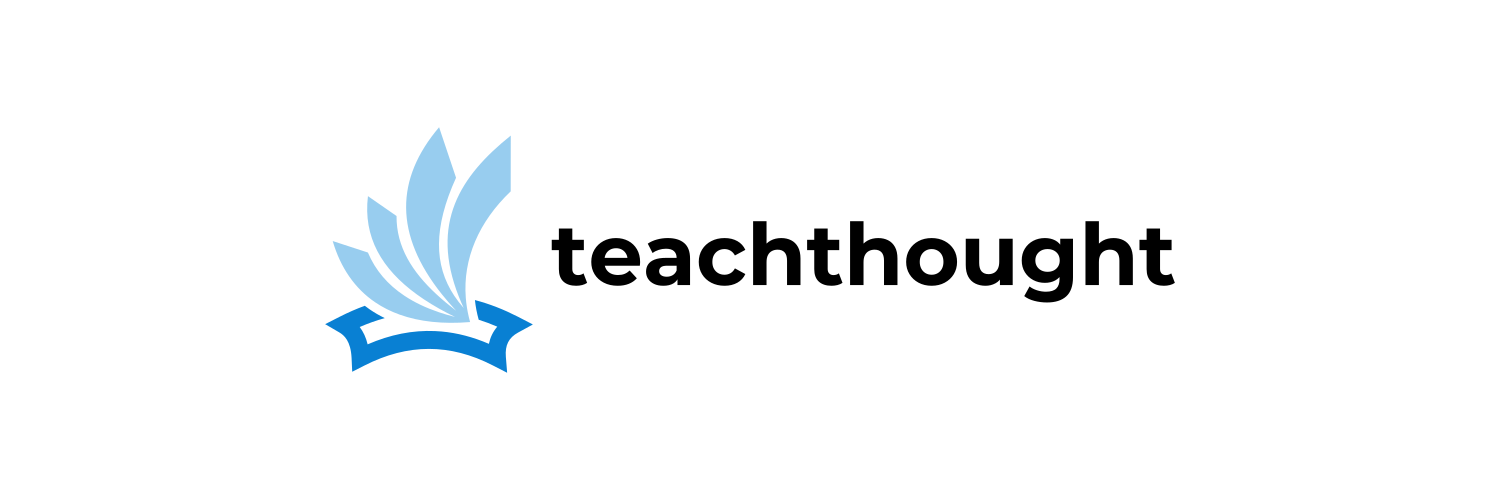
An Updated Guide To Questioning In The Classroom
This guide to questioning in the classroom views questions as signs of understanding, not ignorance–the ability to see what you’re missing.
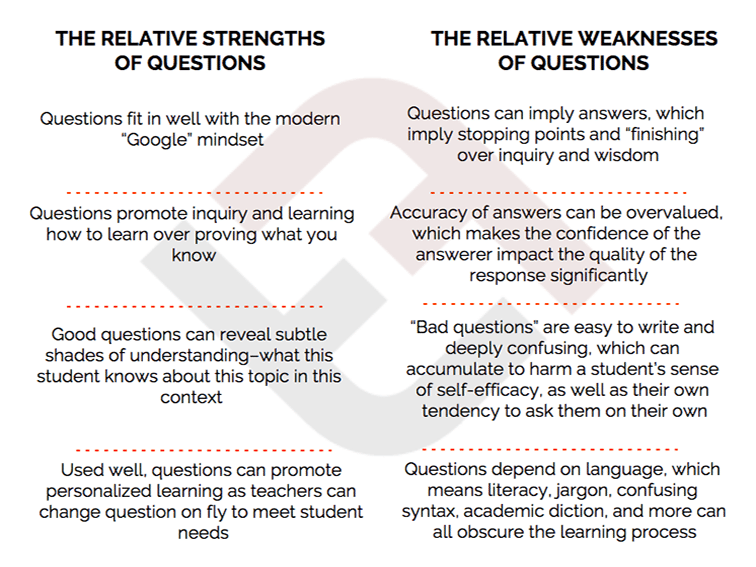
Questioning in the Classroom: An Updated Guide
by Terry Heick
If the ultimate goal of education is for students to be able to answer questions effectively, then focusing on content and response strategies makes sense. If the ultimate goal of education is to teach students to think, then focusing on how we can help students ask better questions themselves might make sense, no?
Why Questions Are More Important Than Answers
The ability to ask the right question at the right time is a powerful indicator of authentic understanding. Asking a question that pierces the veil in any given situation is itself an artifact of the critical thinking teachers so desperately seek in students, if for no other reason than it shows what the student knows, and then implies the desire to know more.
Asking a question (using strategies to help students ask better questions , for example) is a sign of understanding, not ignorance; it requires both knowledge and then–critically–the ability to see what else you’re missing.
Questions are more important than answers because they reflect understanding and curiosity in equal portions. To ask a question is to see both backward and forward–to make sense of a thing and what you know about it, and then extend outward in space and time to imagine what else can be known, or what others might know. To ask a great question is to see the conceptual ecology of the thing.
In a classroom, a student can see a drop of water, a literary device, a historical figure, or a math theorem, but these are just worthless fragments. A student in biology studying a drop of water must see the water as infinitely plural–as something that holds life and something that gives life.
As a marker of life, and an icon of health.
It is a tool, a miracle, a symbol, and a matter of science.
They must know what’s potentially inside a drop of water and how to find out what’s actually inside that drop of water.
They must know what others have found studying water and what that drop of water means within and beyond the field of science.
They must know that water is never really just water.
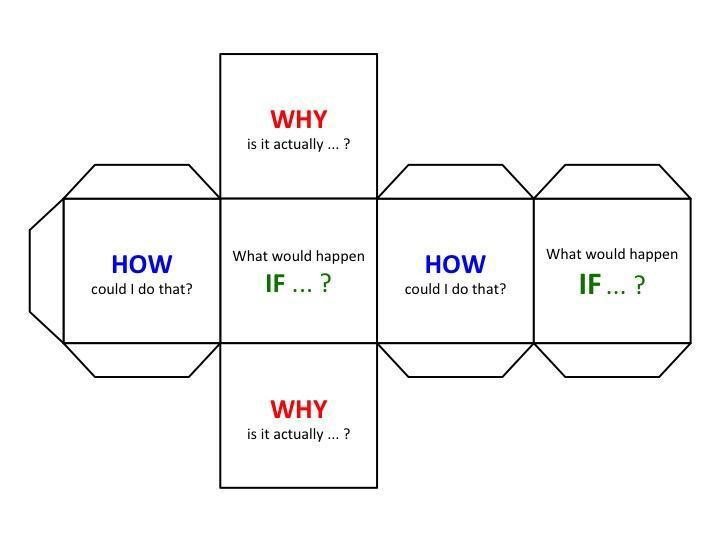
Teacher Questions vs Student Questions
When teachers try to untangle this cognitive mess, they sacrifice personalization for efficiency. There are too many students, and too much content to cover, so they cut to the chase.
Which means then tend towards the universal over the individual–broad, sweeping questions intermingling with sharper, more concise questions that hopefully shed some light and cause some curiosity. In a class of 30 with an aggressively-paced curriculum map and the expectation that every student master the content regardless of background knowledge, literacy level, or interest in the material, this is the best most teachers can do.
This only a bottleneck, though, when the teacher asks the questions. When the student asks the question, the pattern is reversed. The individual student has little regard for the class’s welfare, especially when forming questions. They’re on the clock to say something, anything. Which is great, because questions–when they’re authentic–are automatically personal because they came up with them. They’re not tricks or guess-what-the-teacher’s-thinking.
A student couldn’t possibly capture the scale of confusion or curiosity of 30 other people; instead, they survey their thinking, spot both gaps and fascinations and form a question. This is the spring-loading of a Venus flytrap. The topic crawls around in the student’s mind innocently enough, and when the time is right—and the student is confident—the flower snaps shut. Once a student starts asking questions, that magic of learning can begin.
And the best part for a teacher? Questions reveal far more than answers ever might.
The Purpose of Questions
Thought of roughly as a kind of spectrum, four purposes of questions might stand out, from more “traditional” to more “progressive.”
In What Is The Purpose Of A Question? Terry Heick said:
“To be a little more abstract, a good question causes thinking–more questions. Better questions. It clarifies and reveals. It causes hope.
A bad question stops thinking. It confuses and obscures. It causes doubt.”
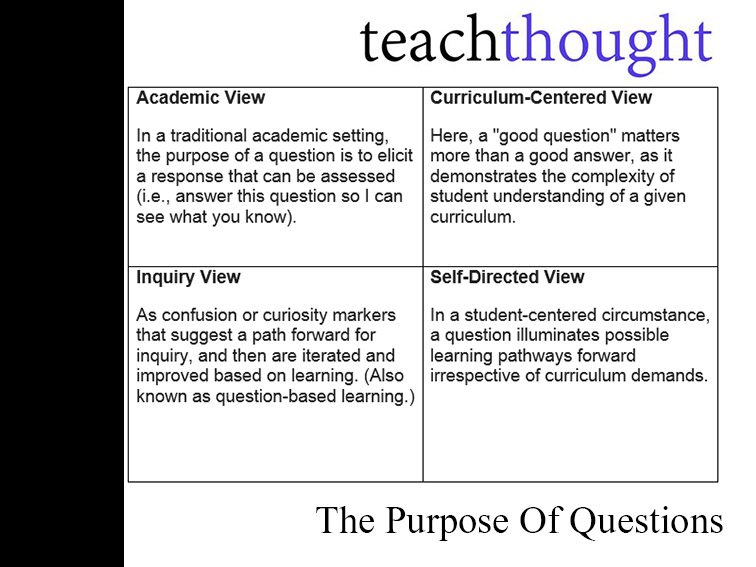
(More Traditional) Academic View
In a traditional academic setting, the purpose of a question is to elicit a response that can be assessed (i.e., answer this question so I can see what you know).
(Less Traditional) Curriculum-Centered View
Here, a ‘good question’ matters more than a good answer, as it demonstrates the complexity of student understanding of a given curriculum.
(More Progressive) Inquiry View
As confusion or curiosity markers that suggest a path forward for inquiry, and then are iterated and improved based on learning. (Also known as question-based learning.)
(More Progressive Still) Self-Directed View
In a student-centered circumstance, a question illuminates possible learning pathways forward irrespective of curriculum demands. The student’s own knowledge demands–and their uncovering–center and catalyze the learning experience.
To be a little more abstract, a good question causes thinking–more questions. Better questions. It clarifies and reveals. It causes hope. A bad question stops thinking. It confuses and obscures. It causes doubt.
The Relative Strengths of Questions
- Good questions can reveal subtle shades of understanding–what this student knows about this topic in this context
- Questions promote inquiry and learning how to learn over proving what you know
- Questions fit in well with the modern “Google” mindset
- Used well, questions can promote personalized learning as teachers can change questions on the fly to meet student needs
The Relative Weaknesses of Questions
- Questions depend on language, which means literacy, jargon, confusing syntax, academic diction, and more can all obscure the learning process
- Questions can imply answers, which imply stopping points and ‘finishing’ over inquiry and wisdom (See questions that promote inquiry-based learning .)
- Accuracy of answers can be overvalued, which makes the confidence of the answerer impact the quality of the response significantly
- “Bad questions” are easy to write and deeply confusing, which can accumulate to harm a student’s sense of self-efficacy, as well as their tendency to ask them on their own
7 Common Written Assessment Question Forms
Questions as written assessment (as opposed to questions as inquiry, questions to guide self-directed learning, or questions to demonstrate understanding) most commonly take the following forms in writing:
Multiple Choice
Short Answer
Diagramming
Questioning In The Classroom & Self-Directed Learning
For years, questions have guided teachers in the design of units and lessons in classrooms, often through the development of essential questions that all students should be able to reasonably respond to and that can guide their learning of existing and pre-mapped content.
In the TeachThought Self-Directed Learning Model , learners are required to create their own curriculum through a series of questions that emphasize self-knowledge, citizenship, and communal and human interdependence. In this model, existing questions act as a template to uncover potential learning pathways.
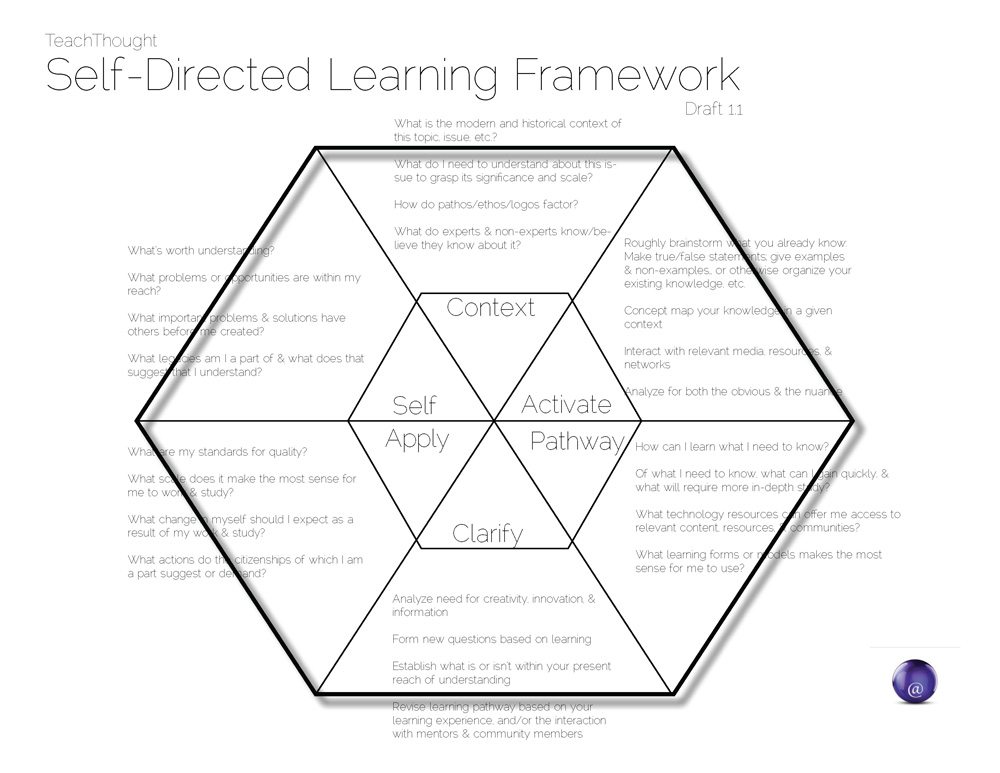
Also, the Question Formation Technique is a powerful strategy for asking questions in the classroom, which you can read about here along with other strategies for helping students ask great questions in the classroom .
What Is Cognitive Dissonance?
Cognitive Dissonance is the cognitively-uncomfortable act of holding two seemingly competing beliefs simultaneously. If you believe that Freedom of Speech is the foundation of democracy, but then are presented with a perspective (through Socratic-style questioning in the classroom from the teacher, for example), you arrive (or the student does) at a crossroads where they have to adjust something–either their belief or their judgment about the validity of the question itself.
In this way, questions can promote Cognitive Dissonance, meaning a good question can change a student’s mind, beliefs, or tendency to examine their own beliefs. Questions, cognitive, and self-reflection go hand-in-hand.
The Role of ‘Lower-Level’ Questions in the Classroom
Lower-level questions inquire at ‘lower levels’ of various learning taxonomies.
These are often ‘recall’ questions that are based in fact—definitions, dates, names, biographical details, etc. Education is thought to have focused (without having been there, who knows for sure?) on these lower levels, and ‘low’ is bad in academics, right? ‘Lower-level’ thinking implies a lack of ‘higher-level’ thinking, so instead of analyzing, interpreting, evaluating, and creating, students are defining, recalling, and memorizing, the former of which make for artists and designers and innovators, and the latter of which make for factory workers.
And that part, at least, is (mostly) true. Recall and memorization aren’t the stuff of understanding, much less creativity and wisdom, except that they are. Bloom’s Taxonomy was not created to segregate ‘good thinking’ from ‘bad thinking.’ In their words, “Our attempt to arrange educational behaviors from simple to complex was based on the idea that a particular simple behavior may become integrated with other equally simple behaviors to form a more complex behavior.” In this way, the taxonomy is simply one way of separating the strands of thinking like different colored yarn–a kind of visual scheme to see the pattern, contrasts, and even sequence of cognitive actions.
Nowhere does it say that definitions, names, labels, and categories are bad–and if it did, we’d have to wonder about the taxonomy rather than assuming that they were. It doesn’t take much imagination to see that if a student doesn’t know there was a war, and that it was fought in the United States in the 1800s, and that it was purportedly over states’ rights, and that both culture, industry, and agriculture all impacted the hows, whens, and whys of the war, that ‘ higher-level thinking strategies’ aren’t going to be very useful.
In short, lower-level questions can illuminate and establish foundational knowledge to build a more complex and nuanced understanding of content. They provide a foothold for thinking. To further the point, in 5 Common Misconceptions About Bloom’s Taxonomy , Grant Wiggins explains that the phrases ‘higher-order’ and ‘lower-order’ don’t appear anywhere in the taxonomy.
Essential Questions in the Classroom
Grant Wiggins defined an essential question as “broad in scope and timeless by nature. They are perpetually arguable.”
Examples of Essential Questions
What is justice?
Is art a matter of taste or principles?
How far should we tamper with our biology and chemistry?
Is science compatible with religion?
Is an author’s view privileged in determining the meaning of a text?
A question is essential when it:
causes genuine and relevant inquiry into the big ideas and core content;
provokes deep thought, lively discussion, sustained inquiry, and new understanding as well as more questions;
requires students to consider alternatives, weigh evidence, support their ideas, and justify their answers;
stimulates vital, ongoing rethinking of big ideas, assumptions, and prior lessons;
sparks meaningful connections with prior learning and personal experiences;
naturally recurs, creating opportunities for transfer to other situations and subjects.
You can see more examples of essential questions here.
9. Think-Pair-Share
Think-Pair-Share is a collaborative learning strategy that promotes discussion and allows students to share their thoughts and questions with a partner before sharing with the larger group.
Think : Pose a thought-provoking question or problem related to the lesson. Give students a few minutes to think about their responses individually.
Pair : Have students pair with a partner to discuss their thoughts and questions. Encourage them to come up with additional questions during their discussion.
Share : Pairs share their questions and ideas with the class. This can be done by having each pair present their most interesting question or facilitating a larger group discussion where pairs contribute to a growing list of questions.
Follow-Up : Use the questions generated from the Think-Pair-Share activity to guide further inquiry, research projects, or class discussions.
10. Wonderwall
Description: A Wonder Wall is a dedicated space in the classroom where students can post questions that come to mind during lessons, discussions, or independent activities. It is a visual and interactive tool to foster a culture of inquiry.
Create the Space: Designate a section of a wall or a bulletin board as the Wonder Wall. Provide sticky notes, markers, and a way for students to add questions easily.
Introduce the Concept: Explain to students that the Wonder Wall is a place for them to post any questions about the topics being studied or other related curiosities. Encourage them to write their questions on sticky notes and place them on the wall.
Regularly Review and Address Questions: Set aside time each week to review the questions on the Wonder Wall. Select a few questions to investigate further as a class or to incorporate into future lessons and activities.
Encourage Peer Interaction: Allow students to read and respond to their peers’ questions on the Wonder Wall. They can add comments, suggestions, or additional questions, creating a collaborative and dynamic learning environment.
Integrate into Curriculum: Use the questions from the Wonder Wall to guide inquiry-based projects, research assignments, or class discussions. This ensures that student curiosity directly influences learning and keeps students engaged.
A Guide To Questioning In The Classroom; image attribution flickr user flickeringbrad
Founder & Director of TeachThought
Watch CBS News
What is Project 2025? What to know about the conservative blueprint for a second Trump administration
By Melissa Quinn , Jacob Rosen
Updated on: July 11, 2024 / 9:40 AM EDT / CBS News
Washington — Voters in recent weeks have begun to hear the name "Project 2025" invoked more and more by President Biden and Democrats, as they seek to sound the alarm about what could be in store if former President Donald Trump wins a second term in the White House.
Overseen by the conservative Heritage Foundation, the multi-pronged initiative includes a detailed blueprint for the next Republican president to usher in a sweeping overhaul of the executive branch.
Trump and his campaign have worked to distance themselves from Project 2025, with the former president going so far as to call some of the proposals "abysmal." But Democrats have continued to tie the transition project to Trump, especially as they find themselves mired in their own controversy over whether Mr. Biden should withdraw from the 2024 presidential contest following his startling debate performance last month.
Here is what to know about Project 2025:
What is Project 2025?
Project 2025 is a proposed presidential transition project that is composed of four pillars: a policy guide for the next presidential administration; a LinkedIn-style database of personnel who could serve in the next administration; training for that pool of candidates dubbed the "Presidential Administration Academy;" and a playbook of actions to be taken within the first 180 days in office.
It is led by two former Trump administration officials: Paul Dans, who was chief of staff at the Office of Personnel Management and serves as director of the project, and Spencer Chretien, former special assistant to Trump and now the project's associate director.
Project 2025 is spearheaded by the Heritage Foundation, but includes an advisory board consisting of more than 100 conservative groups.
Much of the focus on — and criticism of — Project 2025 involves its first pillar, the nearly 900-page policy book that lays out an overhaul of the federal government. Called "Mandate for Leadership 2025: The Conservative Promise," the book builds on a "Mandate for Leadership" first published in January 1981, which sought to serve as a roadmap for Ronald Reagan's incoming administration.
The recommendations outlined in the sprawling plan reach every corner of the executive branch, from the Executive Office of the President to the Department of Homeland Security to the little-known Export-Import Bank.

The Heritage Foundation also created a "Mandate for Leadership" in 2015 ahead of Trump's first term. Two years into his presidency, it touted that Trump had instituted 64% of its policy recommendations, ranging from leaving the Paris Climate Accords, increasing military spending, and increasing off-shore drilling and developing federal lands. In July 2020, the Heritage Foundation gave its updated version of the book to then-White House Chief of Staff Mark Meadows.
The authors of many chapters are familiar names from the Trump administration, such as Russ Vought, who led the Office of Management and Budget; former acting Defense Secretary Chris Miller; and Roger Severino, who was director of the Office of Civil Rights at the Department of Health and Human Services.
Vought is the policy director for the 2024 Republican National Committee's platform committee, which released its proposed platform on Monday.
John McEntee, former director of the White House Presidential Personnel Office under Trump, is a senior advisor to the Heritage Foundation, and said that the group will "integrate a lot of our work" with the Trump campaign when the official transition efforts are announced in the next few months.
Candidates interested in applying for the Heritage Foundation's "Presidential Personnel Database" are vetted on a number of political stances, such as whether they agree or disagree with statements like "life has a right to legal protection from conception to natural death," and "the President should be able to advance his/her agenda through the bureaucracy without hindrance from unelected federal officials."
The contributions from ex-Trump administration officials have led its critics to tie Project 2025 to his reelection campaign, though the former president has attempted to distance himself from the initiative.
What are the Project 2025 plans?
Some of the policies in the Project 2025 agenda have been discussed by Republicans for years or pushed by Trump himself: less federal intervention in education and more support for school choice; work requirements for able-bodied, childless adults on food stamps; and a secure border with increased enforcement of immigration laws, mass deportations and construction of a border wall.
But others have come under scrutiny in part because of the current political landscape.
Abortion and social issues
In recommendations for the Department of Health and Human Services, the agenda calls for the Food and Drug Administration to reverse its 24-year-old approval of the widely used abortion pill mifepristone. Other proposed actions targeting medication abortion include reinstating more stringent rules for mifepristone's use, which would permit it to be taken up to seven weeks into a pregnancy, instead of the current 10 weeks, and requiring it to be dispensed in-person instead of through the mail.
The Alliance Defending Freedom, a conservative legal group that is on the Project 2025 advisory board, was involved in a legal challenge to mifepristone's 2000 approval and more recent actions from the FDA that made it easier to obtain. But the Supreme Court rejected the case brought by a group of anti-abortion rights doctors and medical associations on procedural grounds.
The policy book also recommends the Justice Department enforce the Comstock Act against providers and distributors of abortion pills. That 1873 law prohibits drugs, medicines or instruments used in abortions from being sent through the mail.

Now that the Supreme Court has overturned Roe v. Wade , the volume states that the Justice Department "in the next conservative administration should therefore announce its intent to enforce federal law against providers and distributors of such pills."
The guide recommends the next secretary of Health and Human Services get rid of the Reproductive Healthcare Access Task Force established by the Biden administration before Roe's reversal and create a "pro-life task force to ensure that all of the department's divisions seek to use their authority to promote the life and health of women and their unborn children."
In a section titled "The Family Agenda," the proposal recommends the Health and Human Services chief "proudly state that men and women are biological realities," and that "married men and women are the ideal, natural family structure because all children have a right to be raised by the men and women who conceived them."
Further, a program within the Health and Human Services Department should "maintain a biblically based, social science-reinforced definition of marriage and family."
During his first four years in office, Trump banned transgender people from serving in the military. Mr. Biden reversed that policy , but the Project 2025 policy book calls for the ban to be reinstated.
Targeting federal agencies, employees and policies
The agenda takes aim at longstanding federal agencies, like the National Oceanic and Atmospheric Administration, or NOAA. The agency is a component of the Commerce Department and the policy guide calls for it to be downsized.
NOAA's six offices, including the National Weather Service and National Marine Fisheries Service, "form a colossal operation that has become one of the main drivers of the climate change alarm industry and, as such, is harmful to future U.S. prosperity," the guide states.
The Department of Homeland Security, established in 2002, should be dismantled and its agencies either combined with others, or moved under the purview of other departments altogether, the policy book states. For example, immigration-related entities from the Departments of Homeland Security, Justice and Health and Human Services should form a standalone, Cabinet-level border and immigration agency staffed by more than 100,000 employees, according to the agenda.

If the policy recommendations are implemented, another federal agency that could come under the knife by the next administration, with action from Congress, is the Consumer Financial Protection Bureau.
The agenda seeks to bring a push by conservatives to target diversity, equity and inclusion, or DEI, initiatives in higher education to the executive branch by wiping away a slew of DEI-related positions, policies and programs and calling for the elimination of funding for partners that promote DEI practices.
It states that U.S. Agency for International Development staff and grantees that "engage in ideological agitation on behalf of the DEI agenda" should be terminated. At the Treasury Department, the guide says the next administration should "treat the participation in any critical race theory or DEI initiative without objecting on constitutional or moral grounds, as per se grounds for termination of employment."
The Project 2025 policy book also takes aim at more innocuous functions of government. It calls for the next presidential administration to eliminate or reform the dietary guidelines that have been published by the Department of Agriculture for more than 40 years, which the authors claim have been "infiltrated" by issues like climate change and sustainability.
Immigration
Trump made immigration a cornerstone of his last two presidential runs and has continued to hammer the issue during his 2024 campaign. Project 2025's agenda not only recommends finishing the wall along the U.S.-Mexico border, but urges the next administration to "take a creative and aggressive approach" to responding to drug cartels at the border. This approach includes using active-duty military personnel and the National Guard to help with arrest operations along the southern border.
A memo from Immigration and Customs Enforcement that prohibits enforcement actions from taking place at "sensitive" places like schools, playgrounds and churches should be rolled back, the policy guide states.
When the Homeland Security secretary determines there is an "actual or anticipated mass migration of aliens" that presents "urgent circumstances" warranting a federal response, the agenda says the secretary can make rules and regulations, including through their expulsion, for as long as necessary. These rules, the guide states, aren't subject to the Administration Procedure Act, which governs the agency rule-making process.
What do Trump and his advisers say about Project 2025?
In a post to his social media platform on July 5, Trump wrote , "I know nothing about Project 2025. I have no idea who is behind it. I disagree with some of the things they're saying and some of the things they're saying are absolutely ridiculous and abysmal. Anything they do, I wish them luck, but I have nothing to do with them."
Trump's pushback to the initiative came after Heritage Foundation President Kevin Roberts said in a podcast interview that the nation is "in the process of the second American Revolution, which will remain bloodless if the left allows it to be."
The former president continued to disavow the initiative this week, writing in another social media post that he knows nothing about Project 2025.
"I have not seen it, have no idea who is in charge of it, and, unlike our very well received Republican Platform, had nothing to do with it," Trump wrote. "The Radical Left Democrats are having a field day, however, trying to hook me into whatever policies are stated or said. It is pure disinformation on their part. By now, after all of these years, everyone knows where I stand on EVERYTHING!"
While the former president said he doesn't know who is in charge of the initiative, the project's director, Dans, and associate director, Chretien, were high-ranking officials in his administration. Additionally, Ben Carson, former secretary of Housing and Urban Development under Trump; John Ratcliffe, former director of National Intelligence in the Trump administration; and Peter Navarro, who served as a top trade adviser to Trump in the White House, are listed as either authors or contributors to the policy agenda.
Still, even before Roberts' comments during "The War Room" podcast — typically hosted by conservative commentator Steve Bannon, who reported to federal prison to begin serving a four-month sentence last week — Trump's top campaign advisers have stressed that Project 2025 has no official ties to his reelection bid.
Susie Wiles and Chris LaCivita, senior advisers to the Trump campaign, said in a November statement that 2024 policy announcements will be made by Trump or his campaign team.
"Any personnel lists, policy agendas, or government plans published anywhere are merely suggestions," they said.
While the efforts by outside organizations are "appreciated," Wiles and LaCivita said, "none of these groups or individuals speak for President Trump or his campaign."
In response to Trump's post last week, Project 2025 reiterated that it was separate from the Trump campaign.
"As we've been saying for more than two years now, Project 2025 does not speak for any candidate or campaign. We are a coalition of more than 110 conservative groups advocating policy & personnel recommendations for the next conservative president. But it is ultimately up to that president, who we believe will be President Trump, to decide which recommendations to implement," a statement on the project's X account said.
The initiative has also pushed back on Democrats' claims about its policy proposals and accused them of lying about what the agenda contains.
What do Democrats say?
Despite their attempts to keep some distance from Project 2025, Democrats continue to connect Trump with the transition effort. The Biden-Harris campaign frequently posts about the project on X, tying it to a second Trump term.
Mr. Biden himself accused his Republican opponent of lying about his connections to the Project 2025 agenda, saying in a statement that the agenda was written for Trump and "should scare every single American." He claimed on his campaign social media account Wednesday that Project 2025 "will destroy America."
Congressional Democrats have also begun pivoting to Project 2025 when asked in interviews about Mr. Biden's fitness for a second term following his lackluster showing at the June 27 debate, the first in which he went head-to-head with Trump.
"Trump is all about Project 2025," Pennsylvania Sen. John Fetterman told CNN on Monday. "I mean, that's what we really should be voting on right now. It's like, do we want the kind of president that is all about Project '25?"
Rep. Jim Clyburn of South Carolina, one of Mr. Biden's closest allies on Capitol Hill, told reporters Monday that the agenda for the next Republican president was the sole topic he would talk about.
"Project 2025, that's my only concern," he said. "I don't want you or my granddaughter to live under that government."
In a statement reiterating her support for Mr. Biden, Rep. Frederica Wilson of Florida called Project 2025 "MAGA Republicans' draconian 920-page plan to end U.S. democracy, give handouts to the wealthy and strip Americans of their freedoms."
What are Republicans saying about Project 2025?
Two GOP senators under consideration to serve as Trump's running mate sought to put space between the White House hopeful and Project 2025, casting it as merely the product of a think tank that puts forth ideas.
"It's the work of a think tank, of a center-right think tank, and that's what think tanks do," Florida Sen. Marco Rubio told CNN's "State of the Union" on Sunday.
He said Trump's message to voters focuses on "restoring common sense, working-class values, and making our decisions on the basis of that."
Ohio Sen. J.D. Vance raised a similar sentiment in an interview with NBC's "Meet the Press," saying organizations will have good ideas and bad ideas.
"It's a 900-page document," he said Sunday. "I guarantee there are things that Trump likes and dislikes about that 900-page document. But he is the person who will determine the agenda of the next administration."
Jaala Brown contributed to this report.
Melissa Quinn is a politics reporter for CBSNews.com. She has written for outlets including the Washington Examiner, Daily Signal and Alexandria Times. Melissa covers U.S. politics, with a focus on the Supreme Court and federal courts.
More from CBS News

Biden meets with Democratic mayors as he tries to shore up support

GOP effort to hold Garland in inherent contempt of Congress fails

First Senate Democrat calls on Biden to withdraw from race

Top Biden aides meet with Senate Democrats amid concerns after debate

An official website of the United States government
Here’s how you know
The .gov means it’s official. Federal government websites often end in .gov or .mil. Before sharing sensitive information, make sure you’re on a federal government site.
The site is secure. The https:// ensures that you are connecting to the official website and that any information you provide is encrypted and transmitted securely.
View all Consumer Alerts
Get Consumer Alerts
Credit, Loans, and Debt
Learn about getting and using credit, borrowing money, and managing debt.
View Credit, Loans, and Debt
Jobs and Making Money
What to know when you're looking for a job or more education, or considering a money-making opportunity or investment.
View Jobs and Making Money
Unwanted Calls, Emails, and Texts
What to do about unwanted calls, emails, and text messages that can be annoying, might be illegal, and are probably scams.
View Unwanted Calls, Emails, and Texts
Identity Theft and Online Security
How to protect your personal information and privacy, stay safe online, and help your kids do the same.
View Identity Theft and Online Security
- Search Show/hide Search menu items Items per page 20 50 100 Filters Fulltext search
Got a call about fraud activity on your bank account? It could be a scammer
Did someone supposedly spot fraud or criminal activity on one of your accounts? Did they offer to help “protect” your money by moving it from your bank, investment, or retirement account? Maybe they even asked you to share a verification code? If anyone did any of those things, it’s always a scam. So, what do you do next?
Never move or transfer your money to “protect it.” Your money is fine where it is, no matter what they say or how urgently they say it. Someone who says you have to move your money to protect it is a scammer. Period.
Never share a verification code. Ever . Banks and retirement and investment companies use these codes for online accounts to prove you’re really you. If you share that code, the scammer can use it to prove they’re you. No caller — especially someone from your bank or investment company’s fraud department — will ever ask for the verification code. That’s always a scam.
Stop and check it out. If you’re worried, call your real bank, broker, or investment advisor. Use the number you find on your statement — never the number the caller gave you, which will take you to the scammer.
And if you think your bank or investment fund will protect you, think again. Bank accounts have different (and fewer) protections than credit cards. If you are scammed into moving your money out of your account, you won’t be protected. And you probably won’t get that money back.
If you get a call, text, or message like this, tell your bank or fund right away. Especially if you moved money or shared a verification code. Then tell the FTC: ReportFraud.ftc.gov . Now that you know, share this advice — it could help protect your buddies and their life savings.
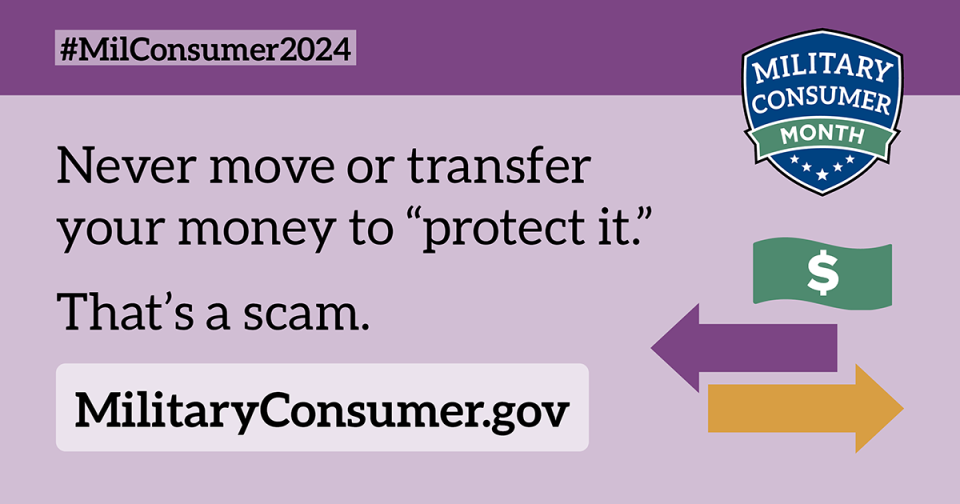
Add new comment
Read our privacy act statement.
It is your choice whether to submit a comment. If you do, you must create a user name, or we will not post your comment. The Federal Trade Commission Act authorizes this information collection for purposes of managing online comments. Comments and user names are part of the Federal Trade Commission’s (FTC) public records system, and user names also are part of the FTC’s computer user records system. We may routinely use these records as described in the FTC’s Privacy Act system notices . For more information on how the FTC handles information that we collect, please read our privacy policy .
Read Our Comment Policy
The purpose of this blog and its comments section is to inform readers about Federal Trade Commission activity, and share information to help them avoid, report, and recover from fraud, scams, and bad business practices. Your thoughts, ideas, and concerns are welcome, and we encourage comments. But keep in mind, this is a moderated blog. We review all comments before they are posted, and we won’t post comments that don’t comply with our commenting policy. We expect commenters to treat each other and the blog writers with respect.
- We won’t post off-topic comments, repeated identical comments, or comments that include sales pitches or promotions.
- We won’t post comments that include vulgar messages, personal attacks by name, or offensive terms that target specific people or groups.
- We won’t post threats, defamatory statements, or suggestions or encouragement of illegal activity.
- We won’t post comments that include personal information, like Social Security numbers, account numbers, home addresses, and email addresses. To file a detailed report about a scam, go to ReportFraud.ftc.gov.
We don't edit comments to remove objectionable content, so please ensure that your comment contains none of the above. The comments posted on this blog become part of the public domain. To protect your privacy and the privacy of other people, please do not include personal information. Opinions in comments that appear in this blog belong to the individuals who expressed them. They do not belong to or represent views of the Federal Trade Commission.
I have received several calls reporting "fraud" via online banking and my debit card, as well as wire transfers. These idits have my bank name, my name, my number, and they always request my user name which is the flag. At first it panicked me. I always check with my bank. These criminals have also used my own banks fraud phone number! How did they get my information?
Thanks for the warning.
In reply to Thanks for the warning. by sonny s lawson
No. Worries any time...
I don’t know anything about this & I’ve not a such call or email from anyone trying ti move money from my bank acct , etc.
Hear you loud and CLEAR!!!!!
The real question is, Is there a division or even a person that will help another person that has experienced identity theft without just stating in the fine print that any of the terms and (Agreements) can be changed at any given time. Or the person that stole your information has assigned a( representative) or (The Company) can continue to make any financial decision because they scammed you the best and certainly have the funds to pay or donate to the correct locations.
In reply to The real question is, Is… by Mark Anthony R…
Report identity theft at www.IdentityTheft.gov . Give details about what happened, and the system will help you create a recovery plan and Identity Theft Affidavit. Use the Affidavit when you contact businesses, debt collectors, financial services and others to correct problems.
Unfortunately, Bank fraud begins within the Banks or credit unions. They apply for the bank jobs, hired. Thereafter, use this to their advantage. Transferring money to fraudulent account, from innocent members. Employees are guilty of this! A friend of mine stated that they blamed the member for the fraudulent activity. But, all alone it was their own tellers getting away with it. This happened with LA Capital Federal Credit Union. This Business needs to be investigated by the FBI immediately. It’s been going on for years.

An official website of the United States government
Here’s how you know
Official websites use .gov A .gov website belongs to an official government organization in the United States.
Secure .gov websites use HTTPS A lock ( Lock A locked padlock ) or https:// means you’ve safely connected to the .gov website. Share sensitive information only on official, secure websites.
JavaScript appears to be disabled on this computer. Please click here to see any active alerts .
- Headquarters | Office of the Administrator (AO)
EPA Selects Educational Organizations to Receive Over $3.6 million to Support Environmental Projects Nationwide
July 8, 2024
WASHINGTON — Today, July 8, the U.S. Environmental Protection Agency announced the selection of 38 organizations to receive over $3.6 million in funding for projects under the Environmental Education Grants Program.
“Advancing environmental education advances EPA’s mission because it better equips our communities with the information they need to protect public health today and in the future,” said EPA Administrator Michael S. Regan. “This year’s environmental education grant recipients will work in underserved communities across the country to foster a deeper understanding of environmental challenges and inspire action towards sustainable solutions.”
The funding will range from $50,000 to $100,000, to organizations that provide environmental education activities and programs. This year’s grantees will conduct project activities in 28 states and the Republic of Palau, America Samoa, the Commonwealth of the Northern Mariana Islands, and Guam.
This year’s environmental education projects include:
- Helping young people in New England grow into a new, inclusive generation of environmental justice problem-solvers through a series of linked experiences.
- Using urban greening initiatives (e.g., tree planting, nature-based solutions, and urban gardening) to help address the impacts of climate change and air pollution in Camden, New Jersey, an environmental justice and overburdened community.
- Transforming a state-of-the-art electric bus into a roving electric classroom that will bring immersive environmental education experiences to 21 Title I elementary schools in Henrico County, Virginia.
- Recruiting educators in Tennessee, particularly from underserved communities, to participate in a year-long cohort focused on environmental education through the lens of addressing climate change resulting in cohort members including climate change education across the curriculum.
- Educating 400 underserved youth in Milwaukee and Southeast Wisconsin on the impacts of climate change in environmental justice communities, empowering them with indigenous knowledge to combat climate change, take action, and create local solutions.
- Employing “m eaningful watershed experiences” to e mpower students, teachers, and community members in Houston, Texas, fostering watershed stewardship to design and implement nature-based solutions to flooding that aim to reduce storm water run-off and the associated pollutants from entering the water supply.
- Engaging students from diverse backgrounds in Kansas and Missouri to come together, dialogue, and take action to address existing barriers to their involvement and interest in green careers.
- Enhancing interest, opportunities, and involvement in green careers for 100 students in rural Colorado, Wyoming, and Utah through the creation of online career resources, statewide virtual youth green careers summits, school-based action projects, mentorship programs and more.
- Braiding indigenous and western science through youth-led community action in the Republic of Palau to address contamination left behind from World War II.
- Establishing a K-12 classroom and outdoor learning space on a peatland conservation parcel in Homer, Alaska, where school visits and field trips will enable students to directly engage with local peatlands, construct native plant gardens, and more.
The following organizations have been selected to receive this year’s Environmental Education Grants:
- CASA, Inc. (CASA de Maryland)
- Colorado Alliance for Environmental Education
- Desert Research Institute
- Ecology Project International
- Explora Science Center & Childrens Museum of Albuquerque
- Galveston Bay Foundation
- Henrico County Public Schools
- Hitchcock Center for the Environment
- Hood Canal Salmon Enhancement Group
- Hubbard County Soil and Water Conservation District 1
- Industry Initiatives for Science and Math Education (Ignited)
- Ipswich River Watershed Association
- Ivy Academy
- Kansas Association for Conservation and Environmental Education
- Learning Endeavors
- Louisiana Environmental Action Network
- Massachusetts Audubon Society
- Minnesota State University - Mankato
- Mississippi State University
- Missouri River Bird Observatory
- National Wildlife Federation (Atlanta)
- National Wildlife Federation (Houston)
- Neighborhood House of Milwaukee
- New Haven Ecological Project
- New York Sun Works
- Nooksack Salmon Enhancement Association
- Openlands
- Protect Our Water Jackson Hole
- Rowan University
- Sierra Streams Institute
- Takshanuk Watershed Council
- The Living Classrooms Foundation
- Trail Blazers
- University of Alaska - Anchorage
- University of Maine
- Upper Iowa University
- Women for a Healthy Environment
- Youth Environmental Alliance
EPA anticipates providing funding for these projects once all legal and administrative requirements are satisfied.
Since 1992, EPA has distributed between $2 million and $3.7 million in EE grant funding each year, for a total of over $95.1 million supporting more than 3,960 projects. The program traditionally provides financial support for projects that design, demonstrate, or disseminate environmental education practices, methods, or techniques. For more information, visit EPA’s Environmental Education webpage .
To learn more about current and past award winners, or to apply for future EE grant competitions, visit the Environmental Education Grants webpage . This website will be updated as future competitions are announced and additional grants are awarded.
1 In a prior version of this press release, Hubbard County Soil and Water Conservation District was erroneously listed as Hubbard County Solid Waste Conservation District.
- SALON FINDER
ASK E-ACADEMY
Online learning.
Discover our new ASK Education eAcademy.
Welcome to the new and improved ASK Education eAcademy!
Designed by hairdressers, for hairdressers the ASK Education eAcademy has been newly revamped to bring you a more dynamic approach to learning, where the power of education is truly in your hands! As your #partnersincraft we are here to support your every step as you develop the skills and knowledge that empower you and your salon.
What is the ASK Education eAcademy?
As we support and nurture your personal growth, our digital learning offering provides ready-to-access education at your fingertips. Focused around one simple question, "what would you like to learn?", the ASK Education eAcademy helps you to learn and grow at your own pace with the latest product knowledge and professional know-how available on demand; ready for you to absorb and master at your own pace with 'pick-up-where-you-left-off' functionality.
ONLINE LEARNING WITH THE ASK EDUCATION eACADEMY
You need to accept cookies to play this video
Where can I access the ASK Education eAcademy?
We're changing the way you learn your craft, where physical blends with digital to complement our face-to-face seminars and training opportunities. The new and improved ASK Education eAcademy is available online through your web browser or across any device, with an intuitive interface that's easy to use – motivating you through your learning journey as you expand your knowledge.
What makes the ASK Education eAcademy so special?
We want to inspire you and give you the confidence to become the hairdresser YOU want to be, which is why the ASK Education eAcademy has been developed with a truly user-centric approach enabling you to create your own journey to success:
- The more you use the ASK Education eAcademy the more personalised your learning experience becomes
- Courses and recommendations are tailored just for you
- Celebrate your process and earn badges by completing courses and learning paths
- Search hundreds of courses with access anywhere, anytime and on any device
- Easily learn everything you want to know
- Be part of a global hairdressing community
Hairdressing is all about craftsmanship, it’s skill-based and there are always more skills to perfect or new techniques and trends to be inspired by. So, what are you waiting for? It's time to unlock your potential with dynamic education that’s always relevant!
Where can I learn more?
Explore our world-class Colour, Backbar, Styling and Visionary seminars; developed to enhance the skills you already have and help you do what you do, better.
LEARN ONLINE!
Master any in-salon service by staying on-trend with the latest tips and tricks and essential product knowledge over on the ASK Education eAcademy .
EXPLORE OUR WORLD OF BEAUTY
Seminars 2024.
We believe that continual education builds highly-motivated salon teams, strengthens client loyalty and ultimately increases salon profitability.

ESSENTIAL LOOKS 1:2024
Discover our Essential Looks 1:2024 trends Intention The Optimists, New Realities and Daring Crowd. Created by the Essential Looks team to uplift and inspire.
Meeting the needs of an increasingly digital world, we have created a sustainable platform for excellence.
- Grades 6-12
- School Leaders
Get our FREE Classroom Seating Charts 🪑
50 Questions To Ask Elementary Kids To Check In and Get To Know Them Better (Free Download!)
Who is your best friend and why?
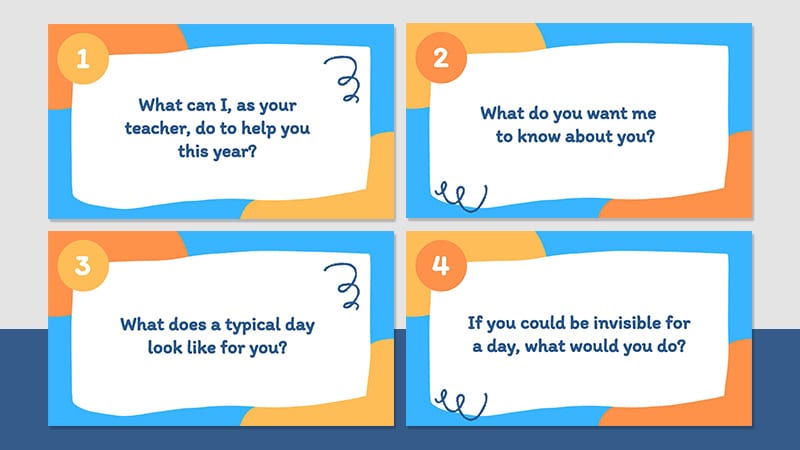
Getting to know the students in your classroom can be tricky. It can be even tougher to connect when you’re teaching online. Despite the challenge, it’s more important than ever to find ways to check in and strengthen your relationship. Not sure where to begin? Here’s a list of 50 questions to ask elementary kids throughout the year.
(Want this entire set of questions in one easy document? Get your free PowerPoint bundle by submitting your email here, so you’ll always have them available!)
1. What can I, as your teacher, do to help you this year?
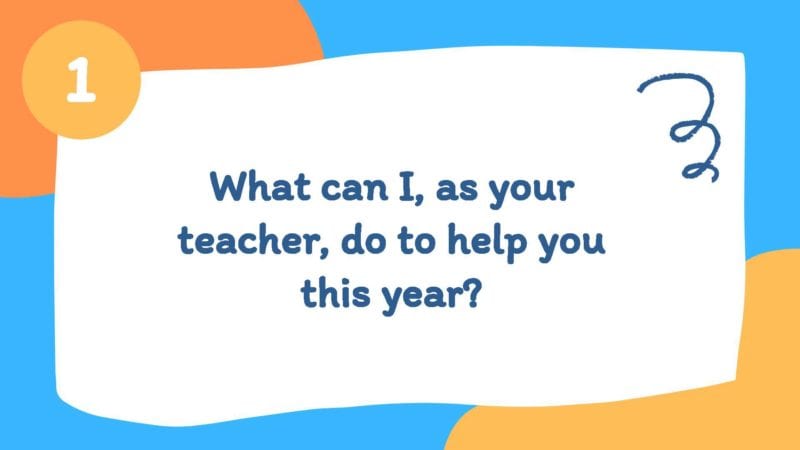
2. What do you want me to know about you?
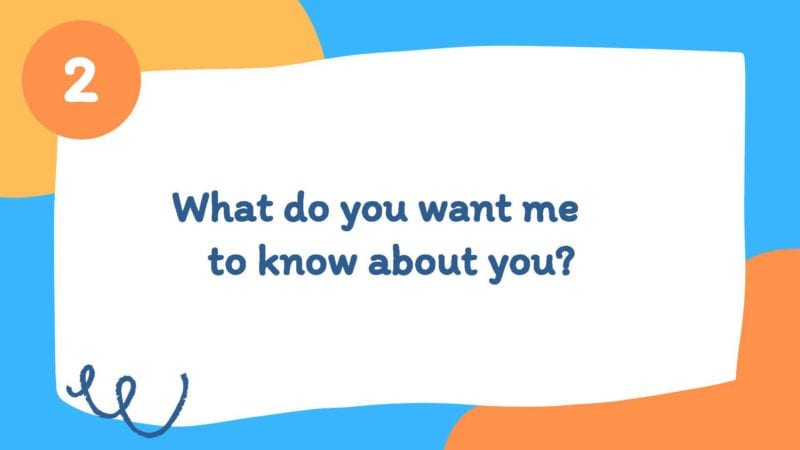
3. What does a typical day look like for you?
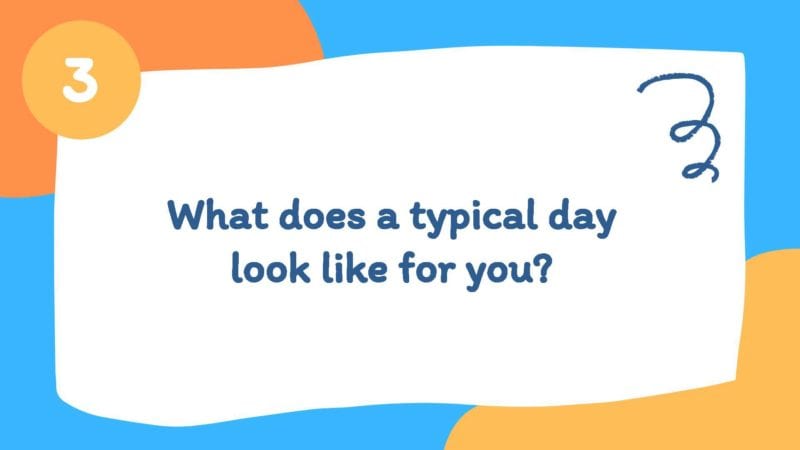
4. If you could be invisible for a day, what would you do?
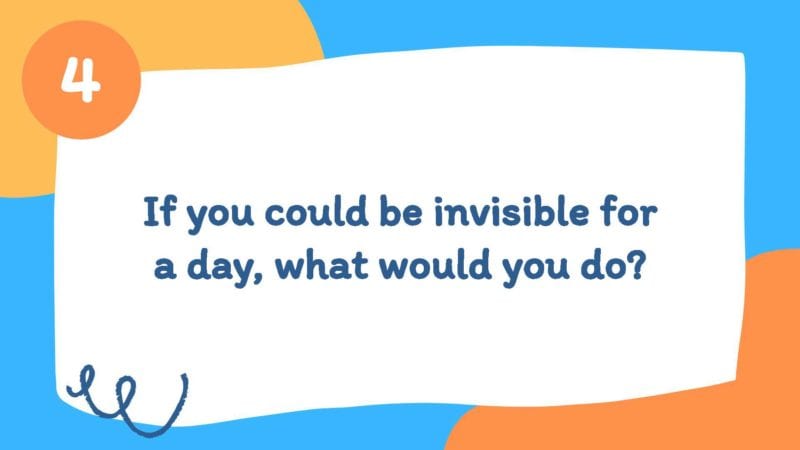
5. What is something that makes your family special?
6. what is your best quality or greatest strength.
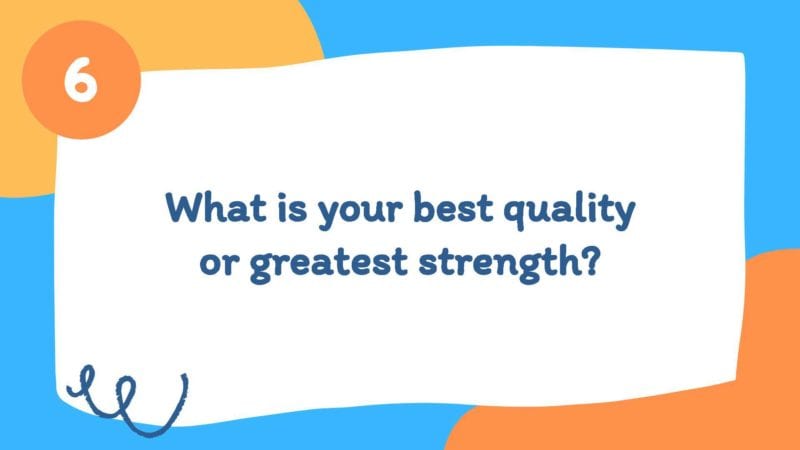
7. What do you like best and least about school?
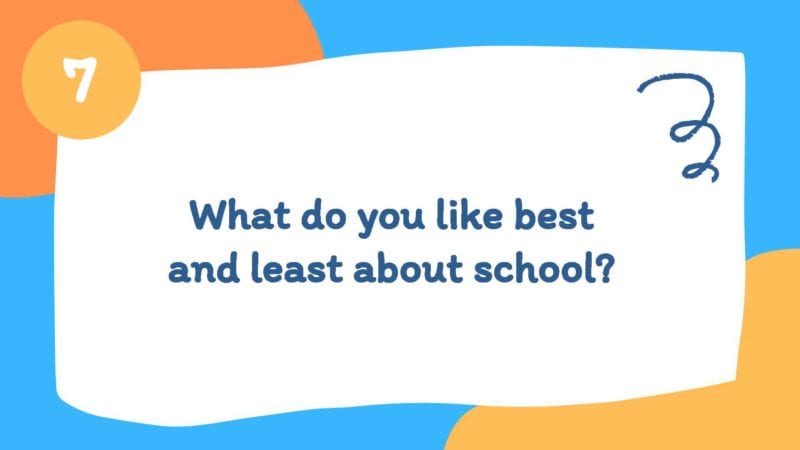
8. If you could change one rule that your family has, what would you change?
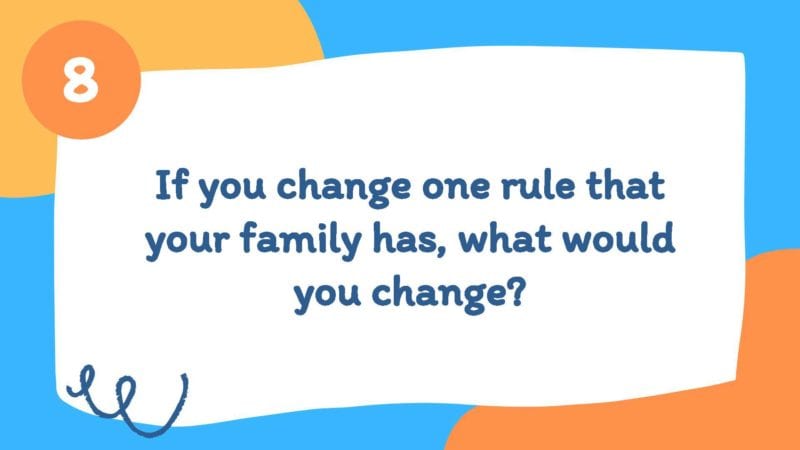
9. What do you enjoy doing with your family?
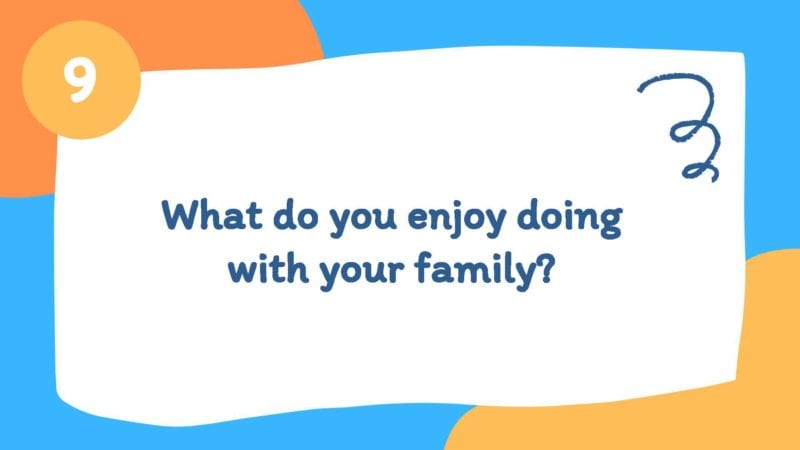
10. What is the best gift you have ever given? Why was it so special?
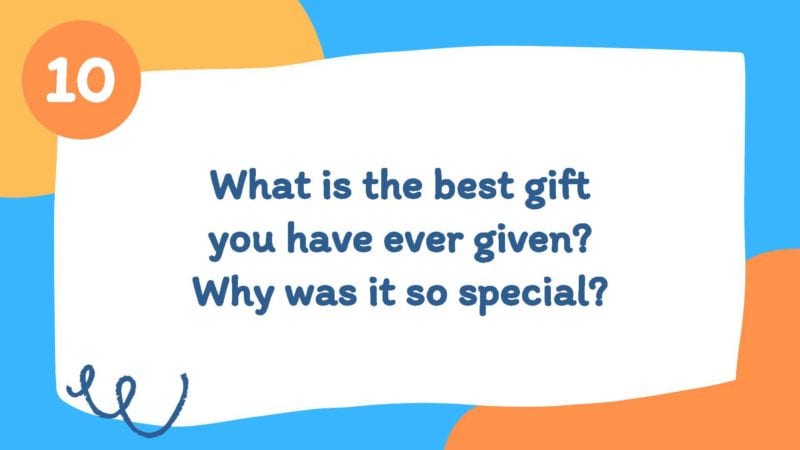
11. What are three things that you do every day?
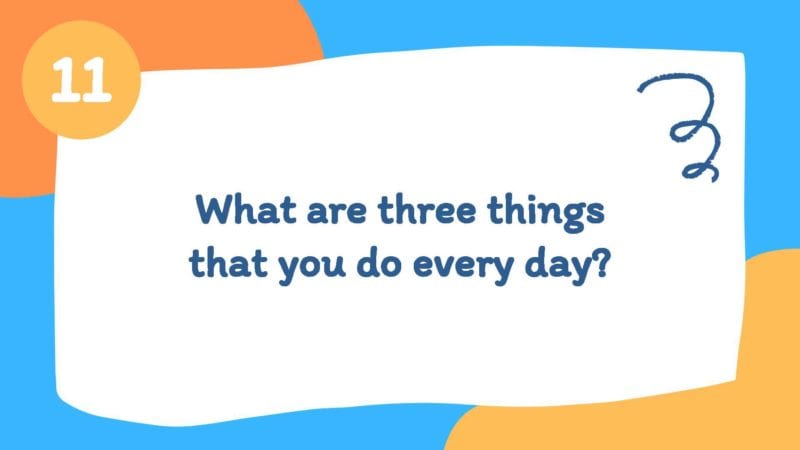
12. If you were a teacher, and the kids in your class would not listen to you, what would you do?
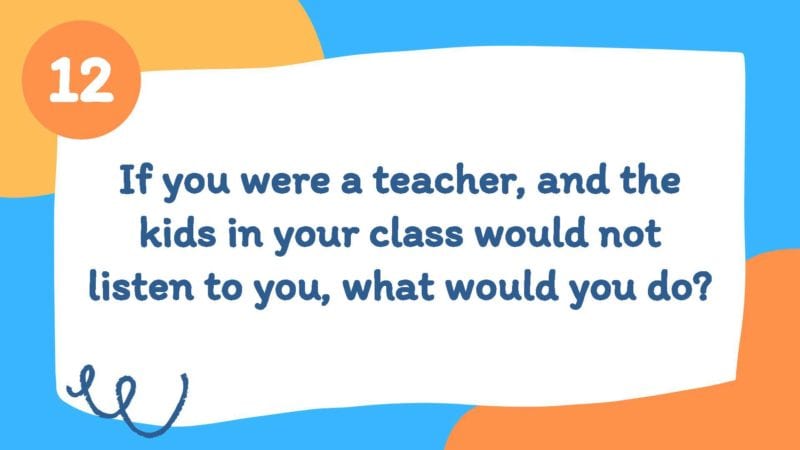
13. Are you a good friend? Why do you think so?
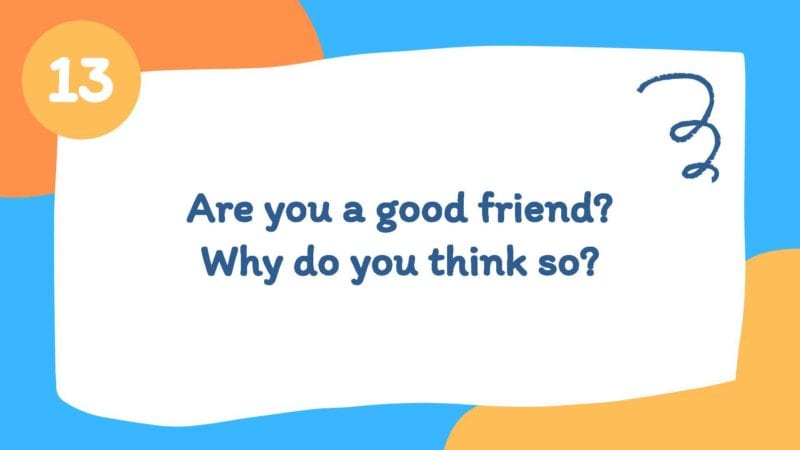
14. How would the world be different if animals could talk?
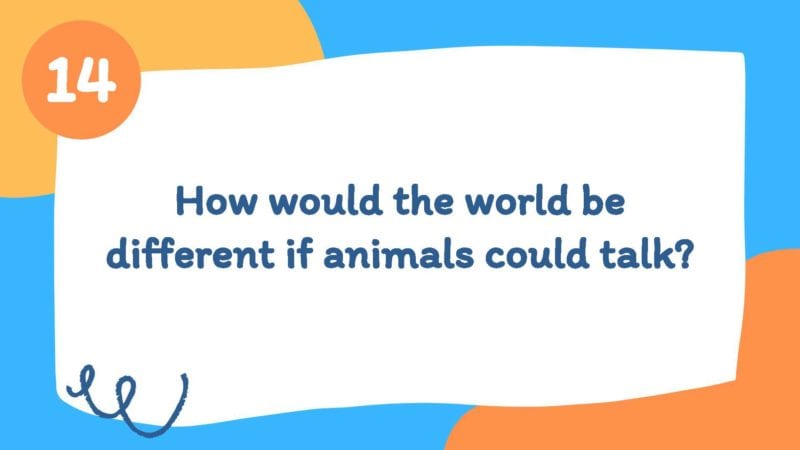
15. What is the hardest thing about being a kid?
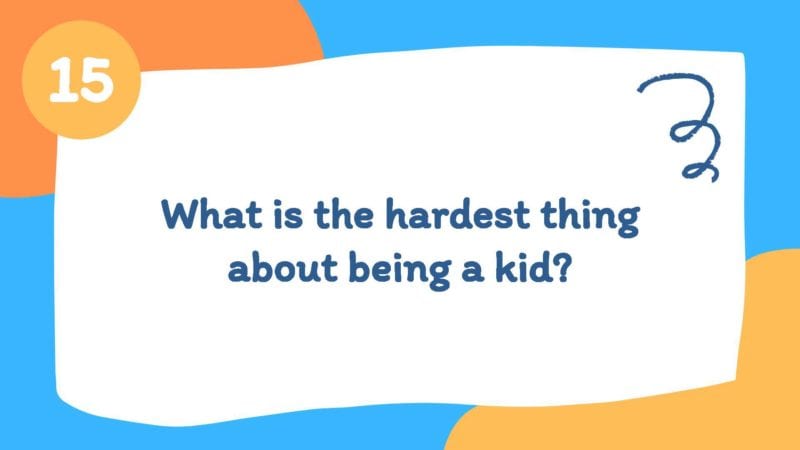
16. What superpower would you like to have and why?
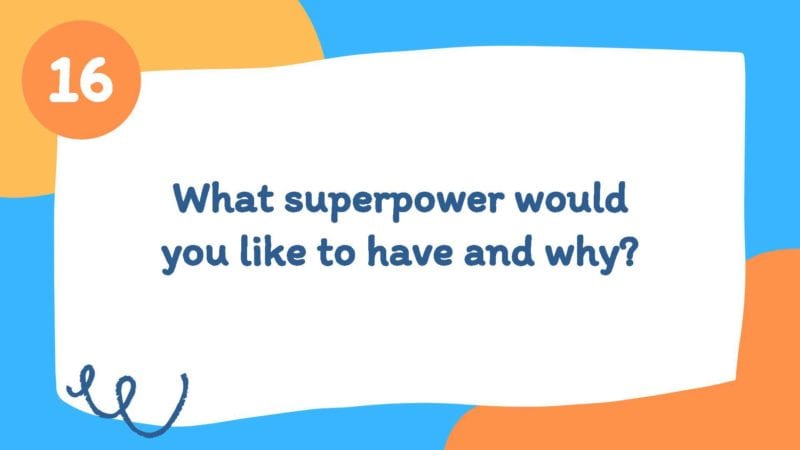
17. If you could make one rule that everyone in the world had to follow, what rule would you make? Why?
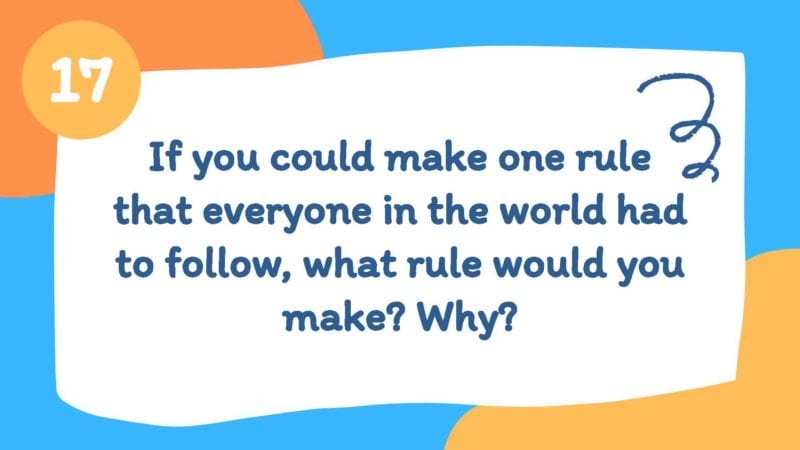
18. How do you like to study?
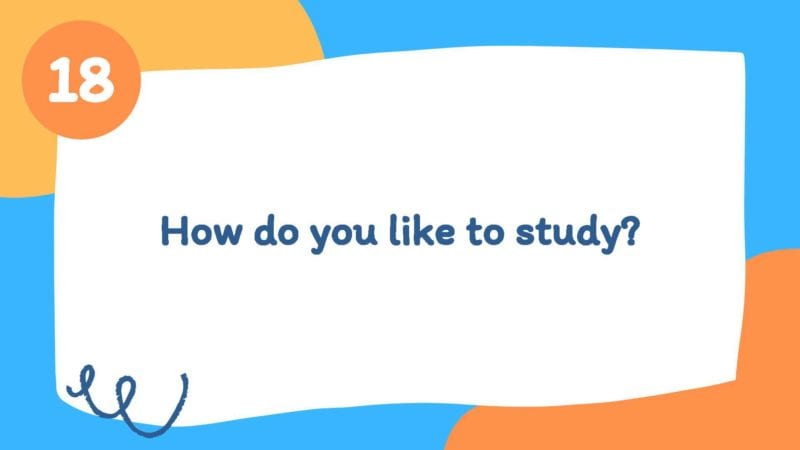
19. Where is your favorite place in the world?
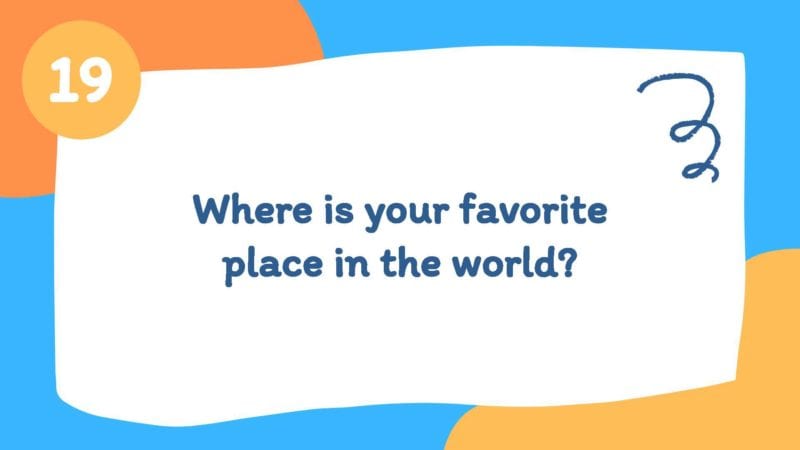
20. If you could change your name, would you? If so, what name would you choose?
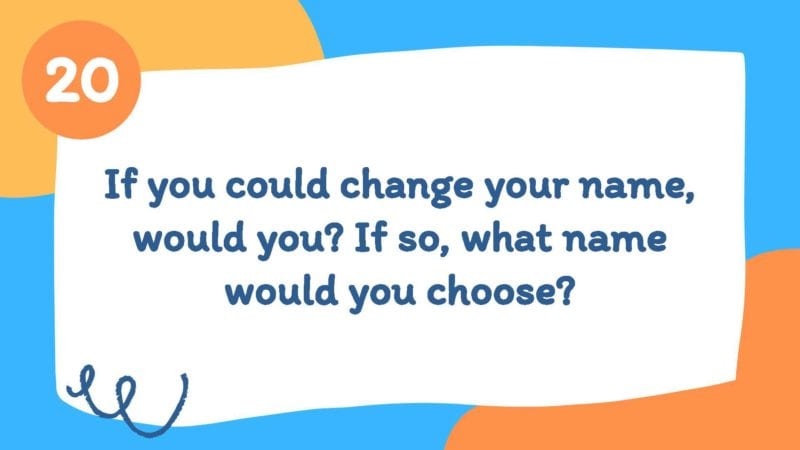
21. If you could give one gift to every single child in the world, what gift would you give?
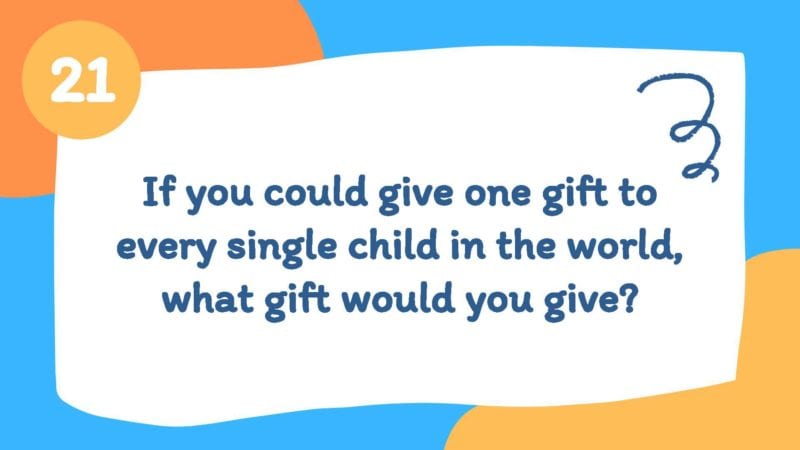
22. What do you want to be when you grow up?
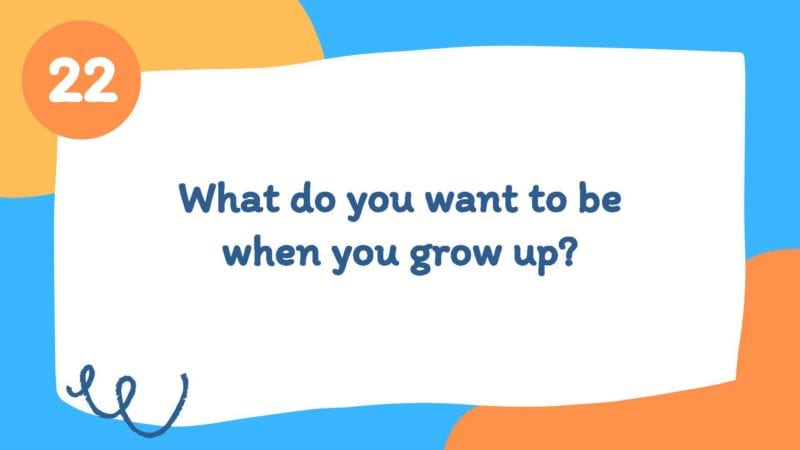
23. What do you love?
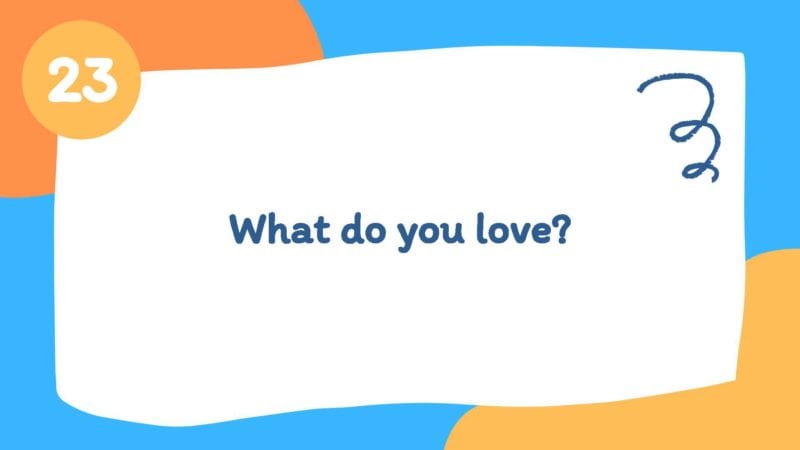
24. What are you most afraid of?
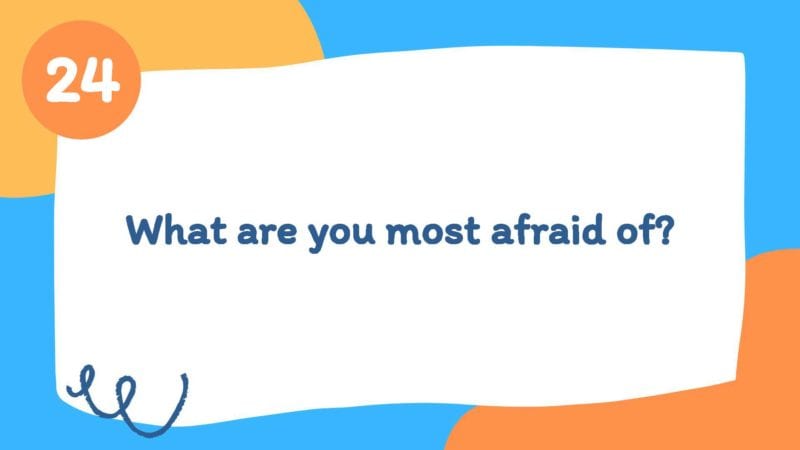
25. What is something you do that bothers other people?
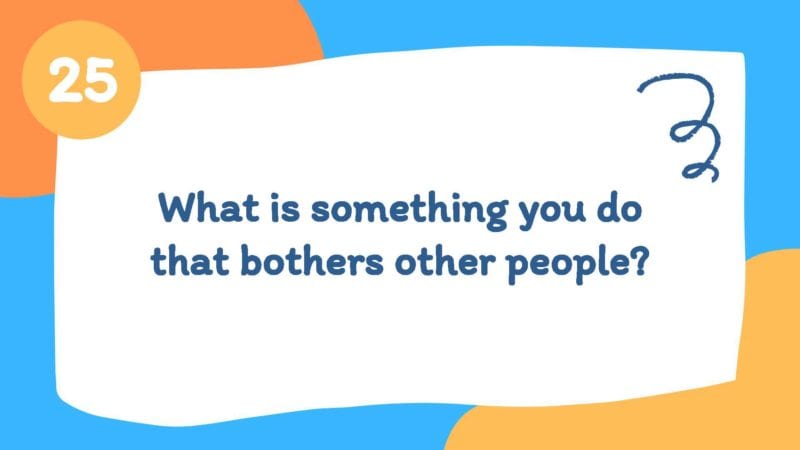
26. Tell me about something happening in the world that concerns you.
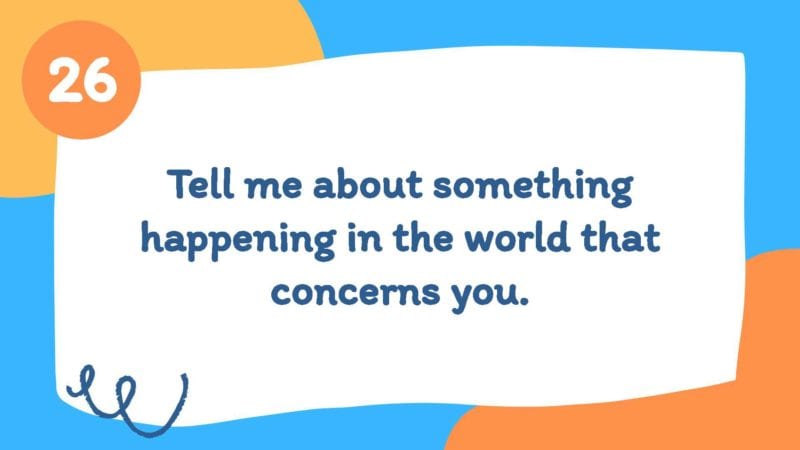
27. Tell me about something happening in the world today that excites or inspires you.
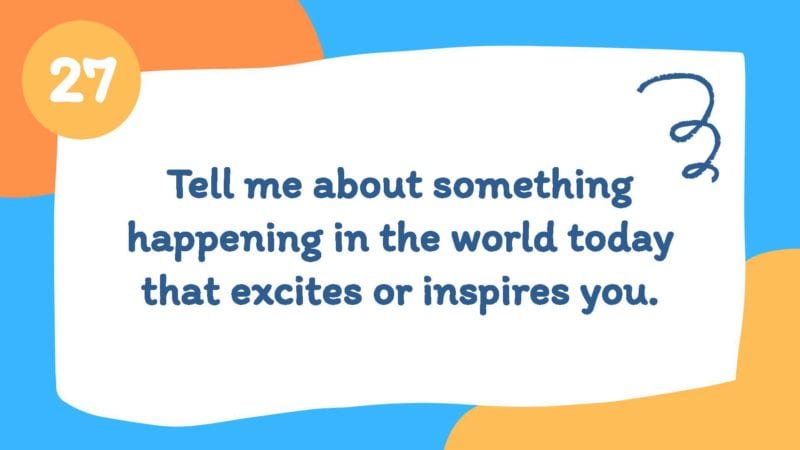
28. What do you know how to do that you can teach to others?
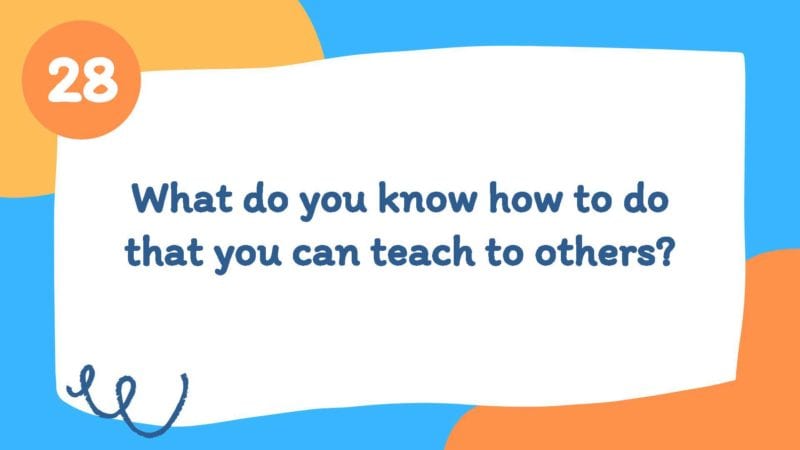
29. Are you organized or messy?
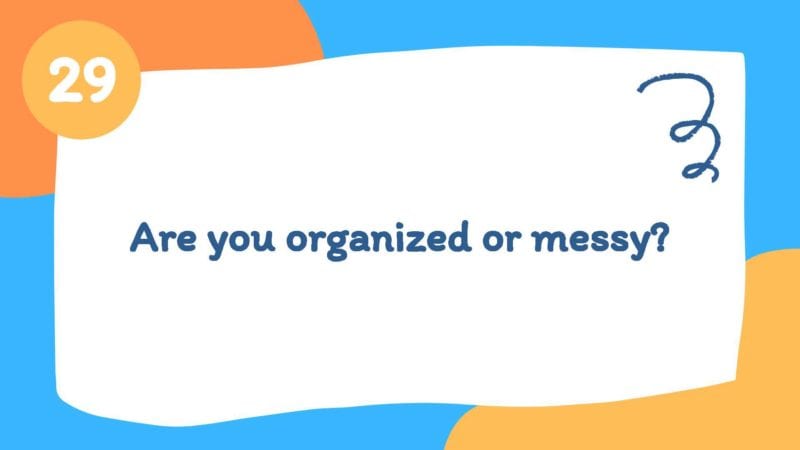
30. Tell me about a funny or scary adventure you had with a friend.
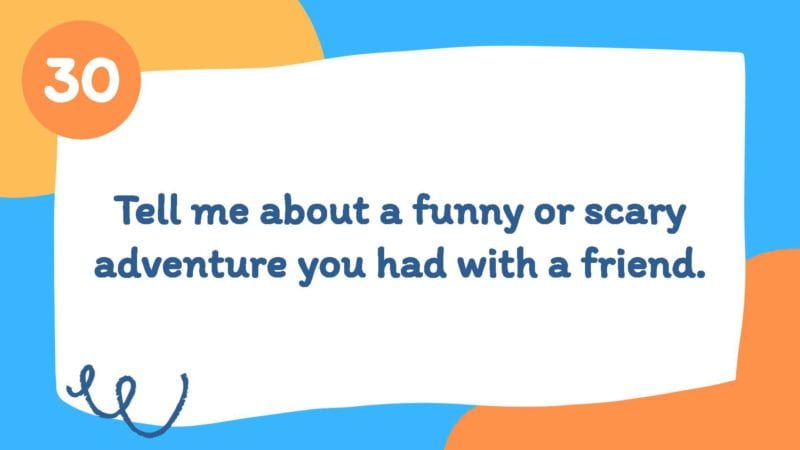
31. What is the funniest thing that ever happened to you?
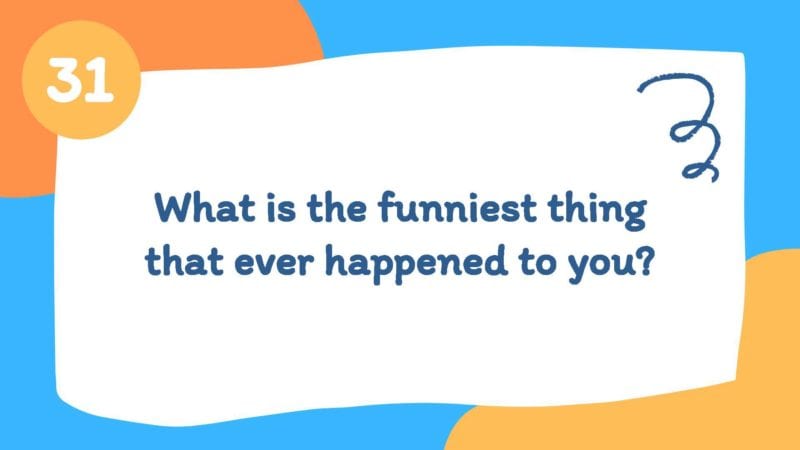
32. Who is your best friend and why?
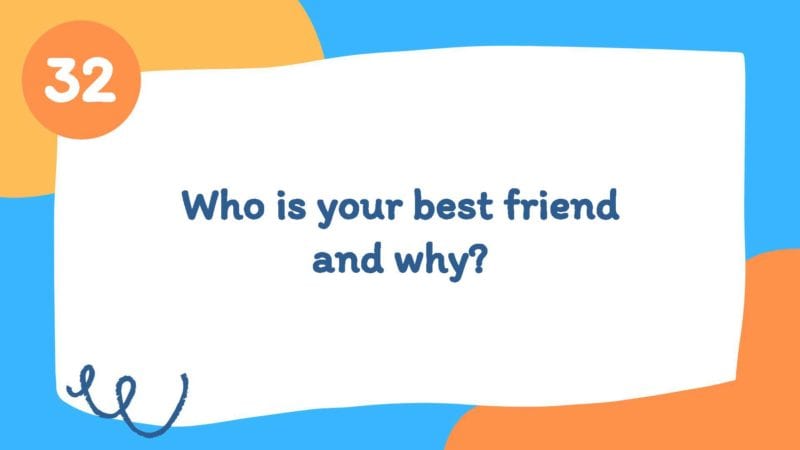
33. How would you change the world if you could?
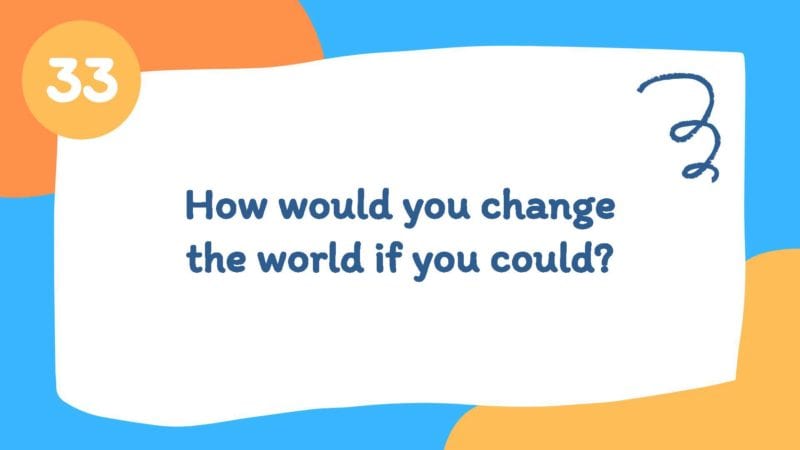
34. If you could move anywhere, where would you live?
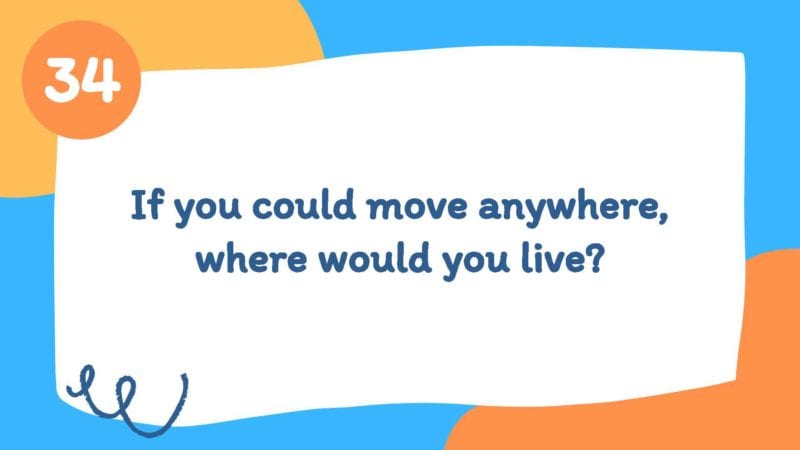
35. If you could be any animal, what would you be?
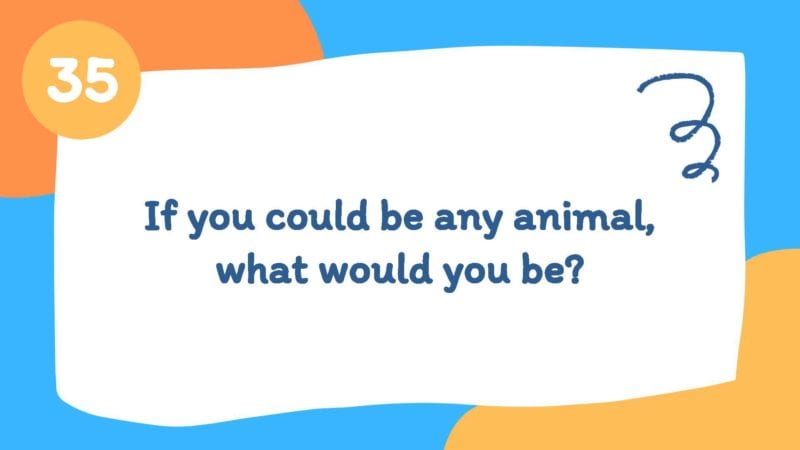
36. What’s your favorite type of food?
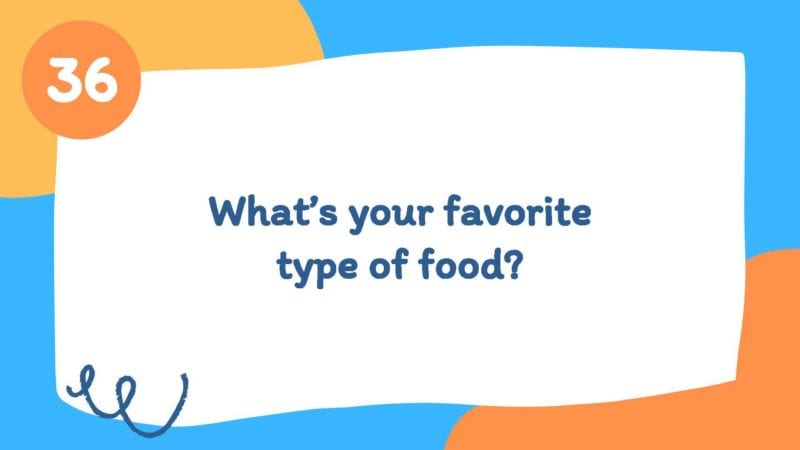
37. What would you change about today?
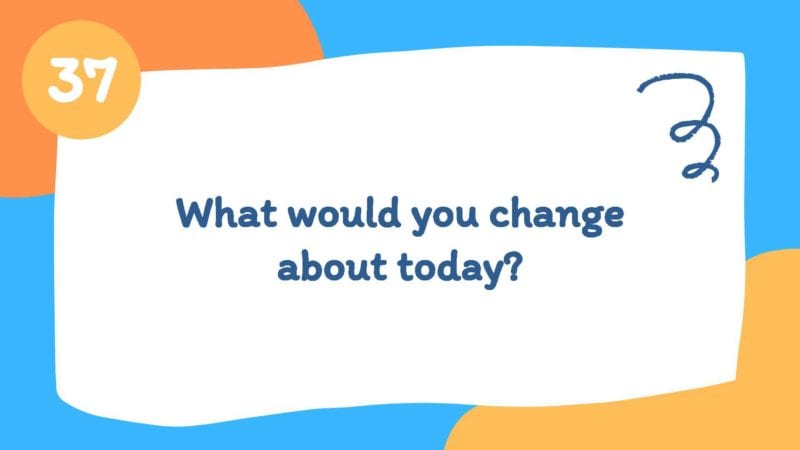
38. What are you looking forward to learning about this year (week, month)?
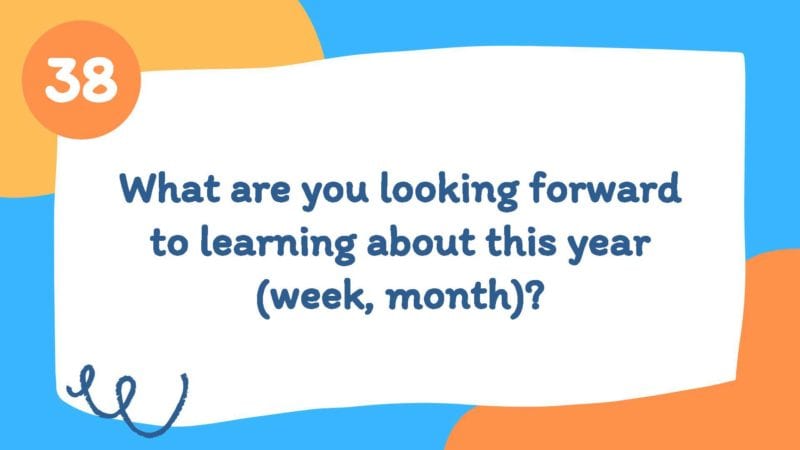
39. If you could be someone else for a day, who would you be and why?
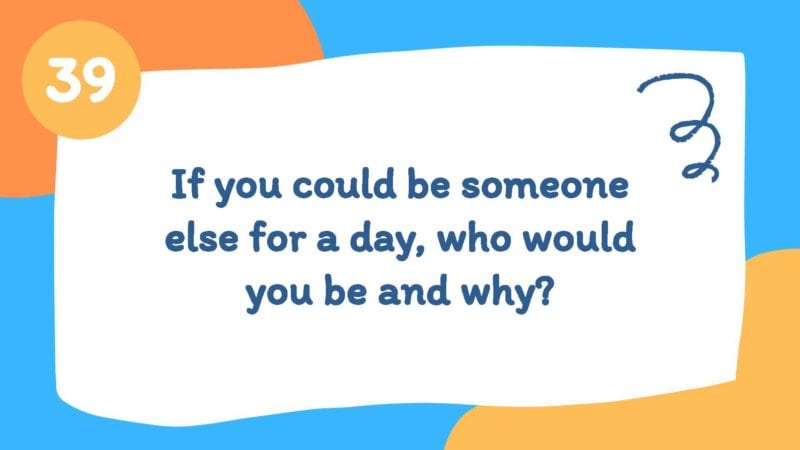
40. What is your favorite season and why?
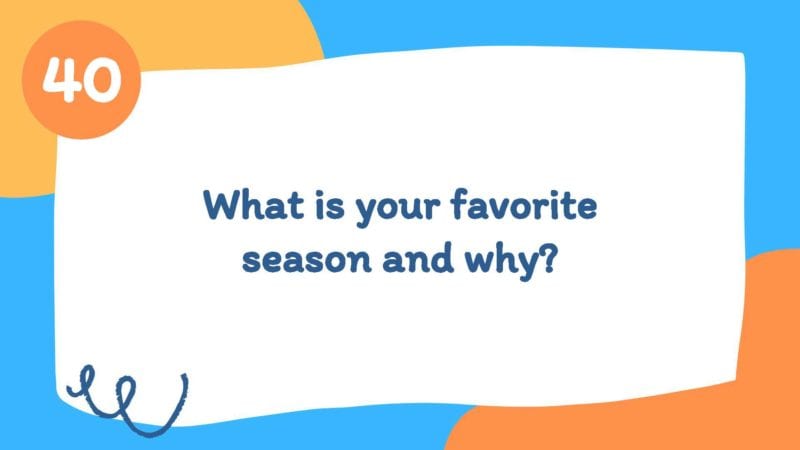
41. What would peanut butter be called if it wasn’t called peanut butter?
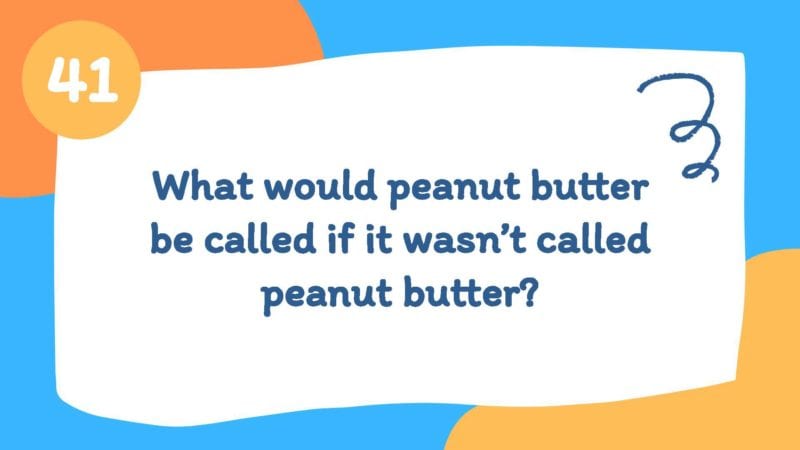
42. What’s your favorite book or movie?
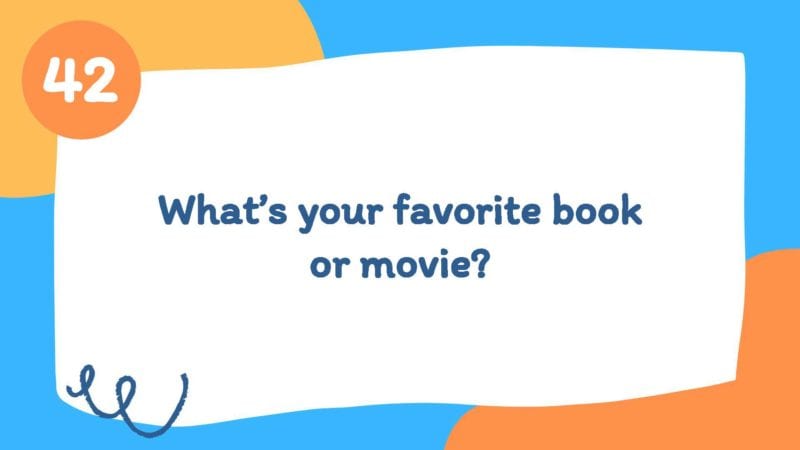
43. How do you handle your emotions when you’re upset?
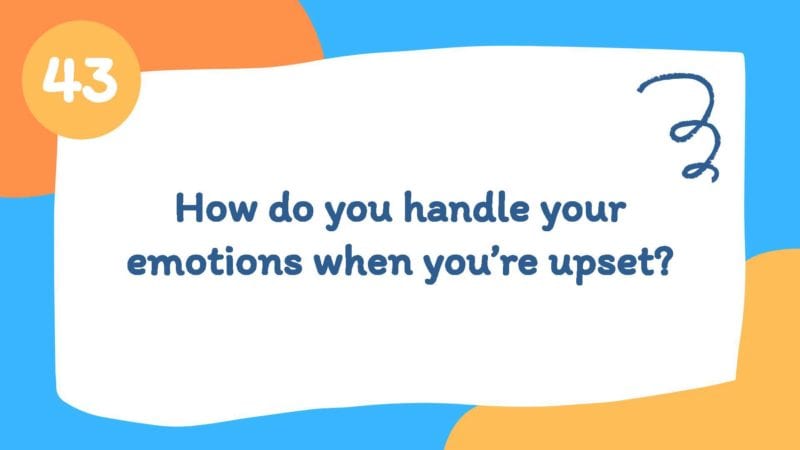
44. If you could be any age, what age would you be?
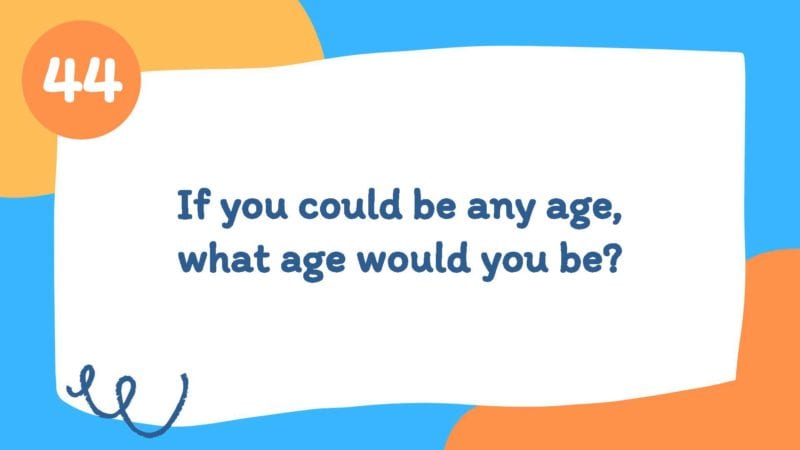
45. Can you remember a time when you had a really good day?
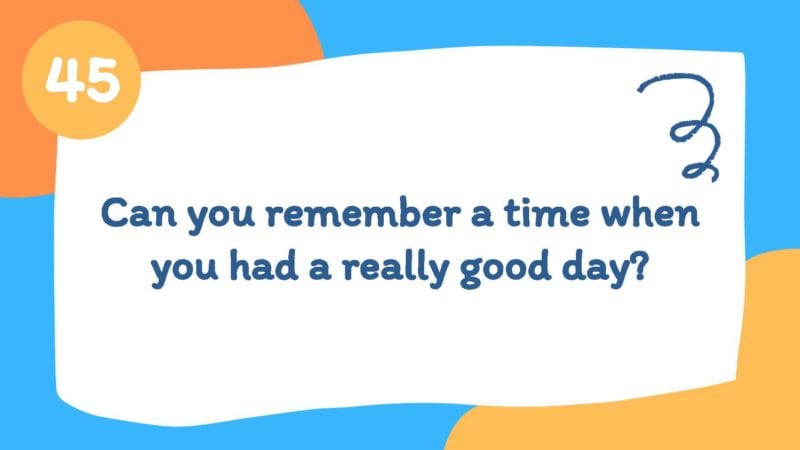
46. What made you laugh today?
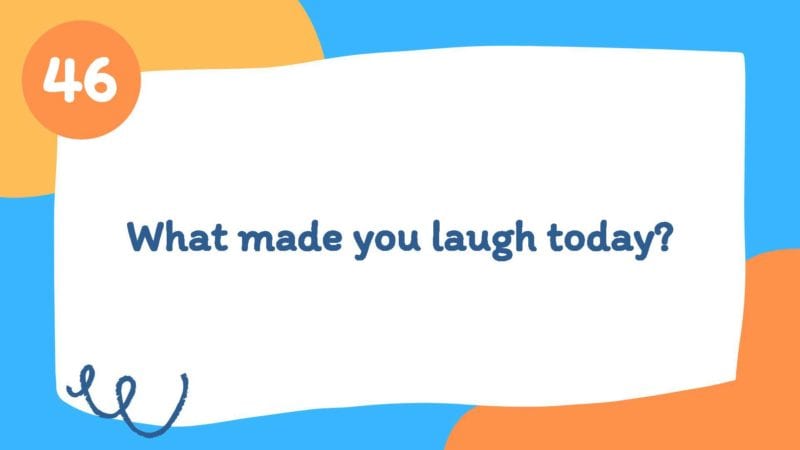
47. What is one thing you couldn’t live without?
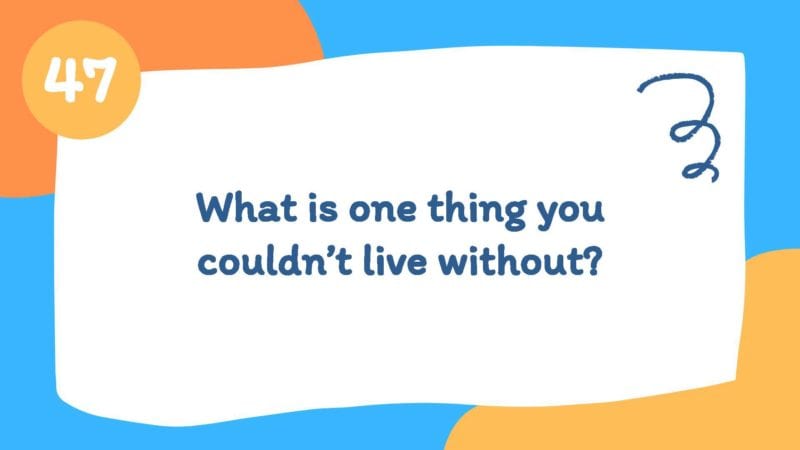
48. What is something you want to learn how to do?
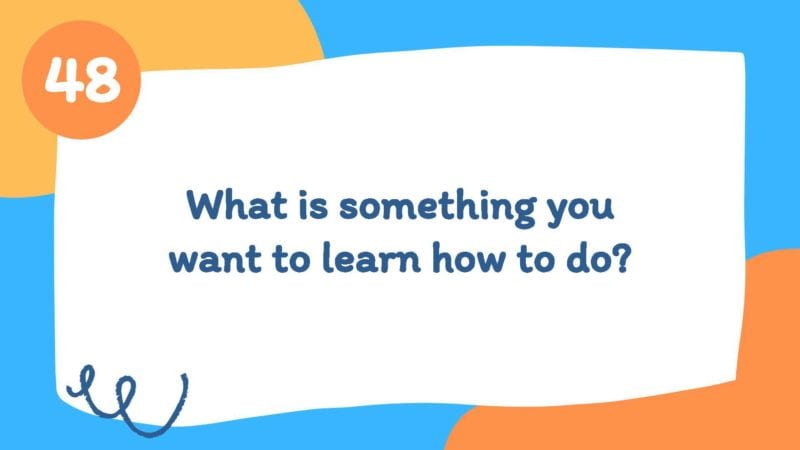
49. What does it mean to be a good friend?
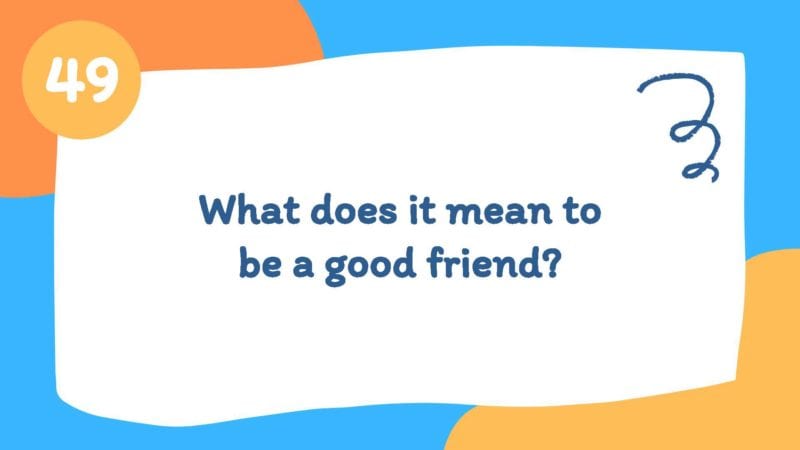
50. What is one thing that you like about yourself?

Plus check out this Free Checklist to Keep Your K-5 Reading Intervention Sessions on Track .
If these questions to ask elementary school kids inspired you, join our WeAreTeachers HELPLINE group and come talk with the very teachers who suggested them!
You Might Also Like
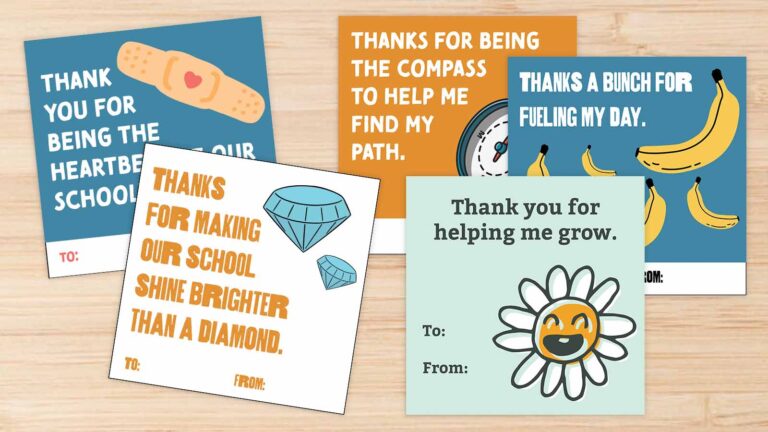
13 Free Printable Thank-You Cards for Custodians, Librarians, and More
Because it takes a lot of special people to keep a school running. Continue Reading
Copyright © 2024. All rights reserved. 5335 Gate Parkway, Jacksonville, FL 32256
- Home
- Articles by country
- Russian Federation
- Aksay, Rostov Oblast
Latitude and longitude of Aksay, Rostov Oblast
- In Russian Federation
GPS coordinates of Aksay, Rostov Oblast, Russian Federation
- © Latitude.to (v1.64-im ) 2024
- Disclaimer and errors
- Cookies policy
Education Questions and Answers
Education and reference q&a.
- Besides physician, what are the best job to walk for within form fastidiousness?
- How Many Semesters Are There In MS Computer Engineering Degree ?
- How do I achieve started home schooling my elevated conservatory son?
- How do i find the stats of the 4 types of MS contained by men v women?
- How full-grown directed play supports children research?
- How do i take cute guys to similar to me contained by soaring conservatory? (guys only)?
- Does anyone know any eloquent quotes/sayings roughly speaking cooking?
- Does anyone know of any apt books written by parents of children beside disabilities?
- How can I procure a better evaluation on the ACT?
- How much does it cost to studie architecture surrounded by the university of harvard?
- Has anyone aligned Texas Teachers citations program?
- Does anyone live within a town beside a population smaller amount than 10,000?
- Find the best acroynm for the following?
- Hours on work/work experience per week during full-time studying/school?
- How do I brand an architecture portfolio for applying to college? Several people have told me that I should consider majoring in architecture contained by college. Most require a portfolio, but I don't really know how to go about building one. I have some pieces from college art class, but not much on my own or architecture related. What should... Home school kids who go rear to regular academy? did you miss out on a lot? especially if you came back surrounded by high school. i was thinking of self home schooled. but i was thinking of all the things i would miss out on... and i'm roughly speaking to go into high school, and i know how heaps things go... 3(b+3)+4b how do you simplify the expression? 7b+3 Remember your distributive property. If you can master that, you'll find your math class easier. The distributive property says that if you want to multiply a number outside of parentheses with a bunch of stuff inside the parenthesis, you've got to multiply that number against each item inside the parentheses... School problems trouble surrounded by classes? i get good grades in college is just that i feel to hyper and i talk to my freinds surrounded by class to much thats were i mess up and fail.and my teachers hold on to calling my house is there any way to stop talking.its not jammy for me as it sounds and any way to... I hold a sound out for race that enjoy their own daycare center? I am a college student considering doing this but I was wondering how much it makes. Im not in it for the money but at indistinguishable time I do want to be able to comfortably support myself with the career I choose. Any guidance? my mom owns her own... Advice on uni bursary grant etc etc contained by scotland? im 22 and my parents dies 3 years ago. i live my self in the family home and have be getting income support for the last 3 years after being signed off. i am goin to university to study neuroscience. saas own said over the phone i would not qualify for a young... Am I wasting time getting an AA within medical assisting if wanting to stir into nursing? I currently just started doing my associate degree in medical assisting. I want to shift into nursing though, am I wasting my time & money (both mine and borrowed ) doing the medical assisting? is doing the medical assisting going to help & benefit me ? I'm pretty confused in what to... What does the quote previously you embark on a mission of revenge, verbs two graves. aim? In means if you are vengeful, you and your target will both die. Well, that's LITERALLY what it means, but it really means revenge is an motivation that will eradicate both the seeker and the sought. I prefer revenge is a dish best served cold.... How do i prepare for the SAT vocabulary? i have the sat vocabulary building books(by kaplan) which provide the meaning.a sentence and synonyms of 1000 words. will reading files and learning the words be enough or should i resort to another method? thanks surrounded by advance please reply as soon as possible Read books that... How do I operation near an annoying autistic kid? There's a new kid at my school and he's autistic. I have to be his minder and look after him, show him around, etc. We're both 16. But he's soooooo unexpected. He'll say inappropriate things at bad moments and sometimes he enjoy standing on tables. Then when we try to get him down, he'll... Can i acquire a position within france for mbbs amount from india? I think it would be advisable that you look at the laws of a country. A lot of developed countries (sadly the discrimination but yes) require you to get your hands on an additional license to practice in their countries. More over I would also suggest that you look at the... Music instructor sterilizes clarinet for ALL students to try, how does he do this? Music teacher sterilizes clarinet for ALL students to try, how does he do this (with inference on the reed - isn't that what actually gets SPIT on it?) My son's group class (his first year) tested the clarinet today and he said that about TWENTY kids used the SAME... What is the function of smooth er and what is a obedient analogy for smooth er? the analogy should be something i understand like WWE, football or volleyball. its prolly like the quarterback. it pass proteins to other parts of the cell. If you're talking about the endoplasmic reticulum of a cell, I would compare it to a superhighway. Generally it's used for... How to attain out of second opening reading? I'm in 9th grade and I hate that class. I don't mind not have two electives just that they class is so boring we read and talk about what we read afterwards sometimes the teacher reads to us. We got to lift a test to get us out but I failed by 2questions we grasp... New Education FAQ Financial Aid | Higher Education | Home Schooling | Homework Help | Preschool | Primary & Secondary Education | Quotations | Special Education | Standards & Testing | Studying Abroad | Teaching | Trivia | General - Education |

IMAGES
VIDEO
COMMENTS
ASK Education is a world-class education offering with digital seminars and hands-on learning, created by hairdressers, for hairdressers.
What is the ASK Education eAcademy? As we support and nurture your personal growth, our digital learning offering provides ready-to-access education at your fingertips. Focused around one simple question, "what would you like to learn?", the ASK Education eAcademy helps you to learn and grow at your own pace with the latest product knowledge and professional know-how available on demand; ready ...
Explore highlights from our ASK Education Seminar Programme for 2024 and celebrate the craft of hair and the value of craftsmanship.
About this app. - Type a part of your question in the search bar. - Click the photo of a question with Camera & Get an instant answer. - Students can ask question, doubts, share study and exam tips and tricks. - Community offers a wide range of High-quality blogs, Extracurricular video content.
The ability to ask questions is one of the most important lifelong learning skills a student can acquire in the course of their education. The Right Question Institute (RQI) is a nonprofit ...
The 5 Most Important Questions We Need to Ask About Education Schools are outdated. It's time for reform. Eric Sangerma · Follow Published in ILLUMINATION · 10 min read · Jun 11, 2020 3
Four educators share ways to encourage students to ask questions, including the "Notice & Wonder" routine.
As we seek to refine and reform today's system of education, we would do well to ask, "What is education?" Our answers may provide insights that get to the heart of what matters for 21st ...
How to ask good questions in the classroom? Learn from teacher educators' recommendations based on a phenomenographic study.
This guide to questioning in the classroom views questions as signs of understanding, not ignorance--the ability to see what you're missing.
The Heritage Foundation's Project 2025 includes a detailed blueprint for the next Republican president to usher in a sweeping overhaul of the executive branch.
Did someone supposedly spot fraud or criminal activity on one of your accounts? Did they offer to help "protect" your money by moving it from your bank, investment, or retirement account? Maybe they even asked you to share a verification code? If anyone did any of those things, it's always a scam. So, what do you do next?
In this three-week online workshop, you'll learn to harness the power of QFT with its original developers, Luz Santana and Dan Rothstein, co-directors of the Right Question Institute and co-authors of Make Just One Change: Teach Students to Ask Their Own Questions (Harvard Education Press).
WASHINGTON — Today, July 8, the U.S. Environmental Protection Agency announced the selection of 38 organizations to receive over $3.6 million in funding for projects under the Environmental Education Grants Program. "Advancing environmental education advances EPA's mission because it better equips our communities with the information they need to protect public health today and in the ...
What is the ASK Education eAcademy? As we support and nurture your personal growth, our digital learning offering provides ready-to-access education at your fingertips. Focused around one simple question, "what would you like to learn?", the ASK Education eAcademy helps you to learn and grow at your own pace with the latest product knowledge and professional know-how available on demand; ready ...
The education and training students need to succeed after high school. Plus, a debate over the value of DEI programs. July 10, 2024 at 3:22 p.m. EDT. ... And questions to ask about DEI.
Welcome to Ask VA (AVA) Get the most complete experience by signing in before starting your message! When you're signed in you will enjoy these benefits: Track your message from submission to resolution. Receive secure responses that will protect your personal information. See all your past messages and responses.
Search for schools in Texas using the AskTED search screen by selecting specific criteria.
Looking for ways to check in and get to know your students a little better? We've created this list of questions to ask elementary kids!
Use the drop-down menus above in order to access the Texas Education Directory Customized Reports and Data Files. Under the Search by menu, you will find searches for School, District, County, Region, and Texas. AskTED is updated daily. Information downloads should be made as close as possible to the time the information will be used ...
Aksay Tourism: Tripadvisor has 442 reviews of Aksay Hotels, Attractions, and Restaurants making it your best Aksay resource.
Things to Do in Aksay, Russia: See Tripadvisor's 442 traveler reviews and photos of Aksay tourist attractions. Find what to do today, this weekend, or in July. We have reviews of the best places to see in Aksay. Visit top-rated & must-see attractions.
Aksay is a town and the administrative center of Aksaysky District in Rostov Oblast, Russia, located on the right bank of the Don River, 18 kilometers northeast of Rostov-on-Don, the administrative center of the oblast.
ASK EDUCATION is an Academic and vocational training institution collaborated with various Industries to offer training of our students. Most of the employers are looking for experienced candidates so we offer industry orientated training programs which will give our students a real industrial exposure not just a Course.These industries will provide Knowledge,learning and skills to our ...
Aksay (Russian: Аксай) is a town and the administrative center of Aksaysky District in Rostov Oblast, Russia, located on the right bank of the Don River, 18 kilometers (11 mi) northeast of Rostov-on-Don, the administrative center of the oblast.
Education and Reference Q&A Besides physician, what are the best job to walk for within form fastidiousness? How Many Semesters Are There In MS Computer Engineering Degree ? How do I achieve started home schooling my elevated conservatory son? How do i find the stats of the 4 types of MS contained by men v women? How full-grown directed play supports children research? How do i take cute guys ...